2000-2013年大陆作者在国外发表教育类论文情况研究——基于SCI和SSCI数据分析
三十个与教育类的文献摘录

三十个与教育类的文献摘录教育类论文参考文献篇1[1]萧宗六,余白主编.学校管理学新编[M].湖北:华中师范大学出版社,2001.[2]柳斌,方亮主编.21世纪教师队伍建设与管理实施全书(二)[M].北京:长城出版社,2000.[3]傅树京.教育管理学导论[M].北京:原子能出版社,2007.[4]罗宾斯(Stephen P.Robbins),戴维A德森佐(DavidA.DeCenzo),穆恩(Henry Moon).毛蕴诗主译.管理学原理(第六版)[M].北京:中国人民大学出版社,2008.[5]沈振佳主编.小学教育评价[M].广东:广东高等教育出版社,2000.[6]顾明远.教育大辞典[Z].上海:上海教育出版社,1998.[7]陶西平.教育评价词典[Z].北京:北京师范大学出版社,1998.[8]梅新林,吴峰民主编.中国教师队伍建设问题与建议--基于天津、吉林、江苏、浙江、河南、贵州、甘肃七省(市)的调研[M].中国社会科学出版社.2010.[9]赵勇,王安琳,杨文中.美国小学教师[M].北京:北京师范大学出版社,2011.[10]王斌华.教师评价:绩效管理与专业发展[M].上海:上海教育出版社,2005.[11]刘铭.当代教育管理引论[M].北京:教育科学出版社,1997.[12]夏芳.中学教师评价的问题及改革策略[D].广西师范大学.2007.[13]王婷.中国、美国小学教师评价指标体系比较研究[D].沈阳师范大学.2009.[14]郭丽莉.中国、日本小学教师评价指标体系比较研究[D].沈阳师范大学.2009.[15]车伟艳.英国小学教师绩效管理评价制度的经验与启示[D].湖北师范大学,2009.[16]王凯.20世纪80年代以来英国基础教育教师评价制度改革探究[D].东北师范大学,2006.[17]井光进.潍坊市小学教师职称改革的现状、问题与对策[D].山东师范大学.2011.教育类论文参考文献篇2[1]余源培.新媒体与意识形态建设[J].河北学刊,2013(1):128-132.[2]李达龙.高校思想政治理论课实效性探究[M].成都:西南交通大学出版社,2013:24-25.[3]徐海鑫,廖浩君.试析新媒体如何在大学生思政教育中有效发挥作用[J].学术论坛,2011(7):193-198.德育研究[4]宁丽新,樊东霞.网络时代高校思政课教育教学的困境及对策[J].北方文学:下,2012(10):151-152.[5]刘明.加强高校远程教育教学过程管理[J].成功(教育版),2012,(11):168.[6]徐树坚.高校无纸化网络考试系统的探讨[J].教育教学论坛,2013(38):272-273.[7]任莉莉.高等职业院校教学质量水平评价体系的思考[J].科技资讯,2014,1(01):130+132[8]徐礼丰.浅议高等职业院校构建教学质量监控和教学评价体系基本框架[J].科技论坛,2015,(6):143-146[9]鲍洁.现代教育技术在高职实践教学中的应用研究[D].西安建筑科技大学,2012.[10]石志勇.现代教育技术在高职院校教学中的应用研究[D].西北农林科技大学,2009.[11]王虹.我国高职院校创业教育教学体系与国外的差异分析[J].[12]华章,2012(33):119.莫亚之,韦厚锺.高职院校创业教育的主要问题与推进措施[J].高教论坛,2014(12):26.[13]张彤.多媒体技术在高职教育教学过程中的应用[J].科技资讯,2012,(18):196.教育类论文参考文献篇3[1]王枬王彦教育叙事:在实践中体悟生命[J],《教育研究》(北京)2005.2[2]王彦王枬,教育叙事-从文学世界到教育世界[J]《全球教育展望》2005第4期[3]张晓乐框架理论视野下的道德叙事[J],《全球教育展望》2005第4期[4]黎加厚信息时代的教育叙事与教师主体意识的觉醒[J],《中国电化教育》2004年第10期[5]丁钢教育与日常实践[J],《教育研究》(北京),2004年第2期[6]丁钢我们如何做教育叙事?--写给教师们[N],《中国教育报》2004年10月21日[7]丁钢教育叙事:接近日常教育‘真相'[N],《中国教育报》(北京),2004年2月19日[8]丁钢日常教育实践的意义[C]《中国教育:研究与评论》教育科学出版社第5辑,北京,2004[9]田静曹芳与项目一同成长:一位村中心完小校长的个案[C],《中国教育:研究与评论》教育科学出版社第5辑,北京,2004[10]丁钢我们如何做教育叙事?--写给教师们[N],《中国教育报》2004年10月21日[11]丁钢教育经验的理论方式[J],《教育研究》(北京),2003年第2期[12]刘云杉帝国权冲实践下的教师生命形态:一个私塾教师的生活史研究[C],《中国教育:研究与评论》2002教育科学出版社第3辑[13]黄向阳学校春秋:一位小学教师的笔记[C]《中国教育:研究与评论》教育科学出版社第2辑,北京,2002年[14]丁钢教育叙述何以可能?[C],《中国教育:研究与评论》2002教育科学出版社第3辑[15]耿涓涓教育理念:一位初中女教师的叙事探究[C]《中国教育:研究与评论》教育科学出版社第2辑,北京,2002年[16]许美德现代中国精神:知名教育家的生活故事[C],《中国教育:研究与评论》2002教育科学出版社第1辑教育类论文参考文献篇4[1]李季湄.幼儿园教育指导纲要(试行)解读[M].江苏出版社,2002,(4):58-112.[2]苏婷.让自制玩教具成为“常青树”[N].中国教育报,2004,(6)[3]鲍小如.徽州地区举办自制玩具展览[J].安徽教育,1980,(4):40-43.[4]谢宁.基于游戏共同体的幼儿园自制玩教具研究[D].南京师范大学,2007,(9)[5]刘焱.儿童游戏通论[M].北京:北京师范大学出版社,2004:53[6]沈晓燕.幼儿园活动区自制玩学具及其效用研究[D].华东师范大学,2007,(5)[7]王晓芬.从幼儿教师自制玩具的演变看其教育观的变化[D].学前教育,2005,(12)[8]肖岚.规范提升学前教育促进教育公平发展[J].江苏政协.2011(06)[9]戴莉.世界学前教育的发展与我们的对策[J].中华女子学院学报.1997(03)[10]陈影.农村学前教育现状分析[J].才智.2012(34)[11]卢云舒.学前教育现状及对策分析--以Y县为例[J].赤峰学院学报(自然科学版).2011(07)教育类论文参考文献篇5★皮连生著的《智育心理学》,人民教育出版社,1996.★吴立岗著的《教学的原理模式和活动》,广西教育出版社,1998.★朱家雄主编的《幼儿家庭教育大全》,中国林业出版社,1990.★顾明远主编的《教育大辞典(1)》,上海教育出版社,1991.★靳玉乐著的《现代课程论》,西南师范大学出版社,1995.★邵瑞珍著的《学与教的心理学》,华东师范大学出版社,1995.★方明编著的《家园合作提高幼儿素质》,科学普及出版社,1997.★卢乐山等主编的《中国学前教育百科全书》,沈阳出版社,1995.★南京师范大学教育系主编的《教育学》,人民教育出版社,1986.★华中师范大学等五院校编写的《教育学》人民教育出版社,1984.★徐学莹等主编的《外国幼儿教育简史》,四川民族出版社,1997.★刘克兰主编的《现代教学论》,西南师范大学出版社,1996.★李季湄、肖湘宁著的《幼儿园教育》,北京师范大学出版社,1997.★袁衍喜编著的《幼儿园活动教程》,高等教育出版社,1995.★黄人颂著的《学前教育学》,人民教育出版社,1995.★华东七省市等编写《幼儿教育学》,上海教育出版社,1993.★全国统编的中等幼儿师范学校教材《幼儿教育学》,人民教育出版社,1987.★李瑞英编写的广西幼儿教师继续教育教材《幼儿教育改革与实践》,1998.★中国人民大学复印刊物《幼儿教育》1990~1998.教育类论文参考文献篇6[1]陈萍.莆仙宫庙壁画艺术研究[D].福建师范大学2012[2]郑芳芳.明清易代背景下的清前期人物画研究[D].福建师范大学2012[3]骈岑.3~6岁儿童绘画表现能力发展的研究[D].上海师范大学2014[4]林颖.中国高等师范院校中国画教育的若干问题思考[D].福建师范大学2012[5]黄菁.民间美术在水墨人物画创作中的运用与拓展[D].福建师范大学2012[6]王雅欣.探寻学龄前校外儿童水粉画教学的新思路[D].福建师范大学2014[7]王艳梅.清代杨柳青人物题材吉祥画的艺术特色[D].福建师范大学2012[8]王盼美惠.5-6岁幼儿绘画表征特征研究[D].南京师范大学2014[9]陈艺红.男权世界中的`女性世界[D].福建师范大学2010[10]刘德宾.中国画与中国戏曲的艺术特征探微[D].福建师范大学2005[11]张玲.从林风眠的调和论看近现代中国画的中西融合[D].福建师范大学2004[12]毛蓉蓉.中国人物画造型的传承与时代性[D].福建师范大学2009[13]黄霖清.论形成(影响)现当代中国人物画造型特点的若干因素[D].福建师范大学2009[14]柳健.以幼儿认知能力培养为目标的色彩启蒙教育研究[D].聊城大学2014[15]秦芳.以绘画视知觉视角下研究4-5岁幼儿绘画语言表达特点[D].新疆师范大学2014[16]王蓉蓉.三大学术思想对中国传统绘画的影响[D].福建师范大学2008[17]郑艳.中国“学院派”美术教育与传统美术教育之间的架构[D].福建师范大学2008[18]倪婷婷.德化现代陶瓷艺术性弱化问题研究[D].福建师范大学2012[19]张永海.画中的人生与如画的人生[D].福建师范大学2008[20]洪文峰.花枝春满天心月圆[D].福建师范大学2010[21]吴晨阳.一脉相承-浅析两宋至现代闽籍中国画人物画家绘画风格中“线”的继承性[D].福建师范大学2011[22]曾春丽.初探福建工艺美术对福建本土中国画画家画风的影响[D].福建师范大学2011教育类论文参考文献篇7[1]中华人民共和国教育部.《3-6岁儿童学习与发展指南》[M].北京:首都师范大学出版社,2012.[2]李季湄、冯晓霞.《3-6岁儿童学习与发展指南》解读[M].北京:人民教育出版社,2013.[3]中华人民共和国教育部指定.《幼儿园教育指导纲要》[S]北京:北京师范大学出版社,2001[4]刘占兰.学前儿童科学教育(第2版)[M].北京:北京师范大学出版社,2008.[5]施燕.学前儿童科学教育[M].上海:华东师范大学出版社,1999.[6]朱家雄.幼儿园课程(第二版)[M].上海:华东师范大学出版社,2011.[7]冯晓霞.幼儿园课程[M].北京:北京师范大学出版社,2000.[8]教育部基础教育司组织编写.《幼儿园教育指导纲要(试行)》解读[M].南京:江苏教育出版社,2002.[9][美]戴维·A·温尼特,罗伯特·A·威廉姆斯等著.刘占兰等译.科学发现--幼儿的探究活动之一[M].北京:北京大学出版社,2005.[10][美]戴维·A·温尼特,罗伯特·A·威廉姆斯等著.刘占兰等译.科学发现--幼儿的探究活动之二[M].北京:北京大学出版社,2005.[11]朱宗顺主编.学前教育原理.[M].北京:中央广播电视大学出版社.2011[12]王微丽主编.幼儿园区域活动-环境创设与活动设计方法.[M].北京:中国轻工业出版社,2014[13]袁爱玲何秀英著.幼儿园教育活动指导策略.[M].北京:北京师范大学出版社,2007[14]蔡春美洪福财等著.幼儿行为观察与记录.[M].上海:华东师范大学出版社,2013[15]刘占兰编.有趣的幼儿科学小实验.[M].北京.北京师范大学出版社,2011[16]王攀峰著.行动研究的理论与方法.[M].北京.首都师范大学出版社,2013[17]胡惠闵郭良菁编著.幼儿园教育评价[M].上海.华东师范大学出版社,2009[18]霍力岩、孙冬梅等著.幼儿园课程开发与教师专业发展-比较研究的视角[M].北京教育科学出版社2006:123[19]霍力岩.学前教育评价.[M].北京.北京师范大学出版社.2000[20][美]RosalindCharlesworthKarenK.Lind著.李雅静等译.幼儿数学与科学教育(第4版)[M].北京.北京师范大学出版社,2011[21]尼古拉斯凯奇等著,张军红等译.孩子的一百种语言.[M].台北光佑文化事业股份有限公司[22][美]贾珀尔等主编.黄瑾等译.学前教育课程(第三版).[M].上海华东师范大学大学出版社.2011[23]秦元东、陈芳等著.如何有效实施幼儿园主题性区域活动.[M].北京中国轻工业出版社.2013[24]董旭花、韩冰川等著.小区域大学问-幼儿园区域环境创设与活动指导.[M]北京.中国轻工业出版社.2013[25]秦元东、王春燕.幼儿园区域活动新论:一种生态学的视角[M].北京:北京师范大学出版社,2008[26]何艳萍,主编.幼儿园区域活动的实践与探索[M].北京:北京师范大学出版社,2010[27]董旭花,主编.幼儿园科学区(室):科学探索活动指导117例[M].北京:中国轻工业出版社,2011[28]陈帼眉,刘焱主编.学期教育新论.[C].北京:北京师范大学出版社,1996[29]王海英著,学前教育社会学.[M].南京:江苏教育出版社,2009[30]刘晓东、卢乐珍等著,学前教育学(第二版).[M].南京:江苏教育出版社,2009[31]蔡迎旗著,学前教育概论.[M].武汉:华中师范大学出版[32]董旭花、刘霞等编著,幼儿园自主性学习区域活动指导.[M].北京:中国轻工业出版社,2014[33]杨娟.大班幼儿戏剧工坊的行动研究.[D].南京师范大学硕士学位论文,2012[34]王和琴.幼儿园个性化美术活动的行动研究.[D].南京师范大学硕士学位论文,2011[35]欧晓燕.幼儿园性教育实施的行动研究.[D].西南大学硕士学位论文.2012[36]黄海燕.少数民族服饰融入幼儿园课程的行动研究.[D].西南大学硕士学位论文.2012[37]刘彤.幼儿园科学探究活动教师指导语运用策略研究[D].西北师范大学硕士学位论文,2009.[38]史孚.幼儿园探究性学习活动及其指导策略研究[D].东北师范大学硕士学位论文,2007.[39]李槐青.当前幼儿园科学教育中的问题及对策研究[D].湖南师范大学硕士学位论文,2006[40]朱金玲.幼儿园中班科学教育活动教师指导研究[D].河北大学硕士学位论文,2011总之,做任何事情都要注重每一个细节.不管是整个论文还是其中一部分的参考文献,只要都重视,一定会写出令人满意的论文.以上针对学前教育硕士论文参考文献案例的详细介绍,希望可以帮到广大教育类论文参考文献篇8[1]彭玉琨,张捷,贾大光.教育平等理论内涵分析与促进教育平等进程策略研究[J].东北师大学报.1998(06)[1]林毅夫,蔡日方,李周.中国经济转型时期的地区差距分析[J].经济研究.1998(06)[2]都阳,John Giles.城市劳动力市场上的就业冲击对家庭教育决策的影响[J].经济研究.2006(04)[4]岳昌君.教育对个人收入差异的影响[J].经济学(季刊).2004(S1)[5]孙志军.中国教育个人收益率研究:一个文献综述及其政策含义[J].中国人口科学.2004(05)[6]张红宇.城乡居民收入差距的平抑机制:工业化中期阶段的经济增长与政府行为选择[J].管理世界.2004(04)[7]林光彬.等级制度、市场经济与城乡收入差距扩大[J].管理世界.2004(04)[8]李雪松,詹姆斯·赫克曼.选择偏差、比较优势与教育的异质性回报∶基于微观数据的实证研究[J].经济研究.2004(04)[9]董先安.浅释中国地区收入差距:1952-2002[J].经济研究.2004(09)[10]周英章,孙崎岖.我国教育投入对实际经济增长的贡献实证分析[J].中国软科学.2002(07)[11]仇立平.职业地位:社会分层的指示器--上海社会结构与社会分层研究[J].社会学研究.2001(03)[12]蔡增正.教育对经济增长贡献的计量分析--科教兴国战略的实证依据[J].经济研究.1999(02)[13]张长征,郇志坚,李怀祖.中国教育公平程度实证研究:1978-2004--基于教育基尼系数的测算与分析[J].清华大学教育研究.2006(02)[14]冉幕娟,吴永球,陈永丽.城乡教育不平等与收入差距关系研究[J].山西财经大学学报(高等教育版).2006(01)[15]张海峰.城乡教育不平等与收入差距扩大--基于省级混合截面数据的实证分析[J].山西财经大学学报.2006(02)[16]江小涓,李辉.我国地区之间实际收入差距小于名义收入差距--加入地区间价格差异后的一项研究[J].经济研究.2005(09)。
教师教育学术期刊推荐
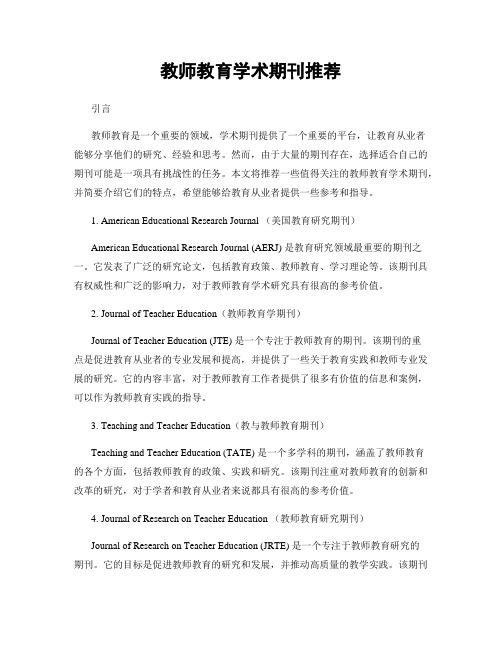
教师教育学术期刊推荐引言教师教育是一个重要的领域,学术期刊提供了一个重要的平台,让教育从业者能够分享他们的研究、经验和思考。
然而,由于大量的期刊存在,选择适合自己的期刊可能是一项具有挑战性的任务。
本文将推荐一些值得关注的教师教育学术期刊,并简要介绍它们的特点,希望能够给教育从业者提供一些参考和指导。
1. American Educational Research Journal (美国教育研究期刊)American Educational Research Journal (AERJ) 是教育研究领域最重要的期刊之一。
它发表了广泛的研究论文,包括教育政策、教师教育、学习理论等。
该期刊具有权威性和广泛的影响力,对于教师教育学术研究具有很高的参考价值。
2. Journal of Teacher Education(教师教育学期刊)Journal of Teacher Education (JTE) 是一个专注于教师教育的期刊。
该期刊的重点是促进教育从业者的专业发展和提高,并提供了一些关于教育实践和教师专业发展的研究。
它的内容丰富,对于教师教育工作者提供了很多有价值的信息和案例,可以作为教师教育实践的指导。
3. Teaching and Teacher Education(教与教师教育期刊)Teaching and Teacher Education (TATE) 是一个多学科的期刊,涵盖了教师教育的各个方面,包括教师教育的政策、实践和研究。
该期刊注重对教师教育的创新和改革的研究,对于学者和教育从业者来说都具有很高的参考价值。
4. Journal of Research on Teacher Education (教师教育研究期刊)Journal of Research on Teacher Education (JRTE) 是一个专注于教师教育研究的期刊。
它的目标是促进教师教育的研究和发展,并推动高质量的教学实践。
高等教育类ssci25篇外文

高等教育类ssci25篇外文摘要:一、引言1.高等教育的重要性2.SSCI期刊在高等教育研究中的地位3.外文文献对我国高等教育发展的启示二、SSCI 25 篇外文文献内容梳理1.文献主题分布2.研究方法与实证分析3.主要研究发现与观点三、高等教育改革与发展策略1.提升教育质量与公平性2.创新与创业能力的培养3.国际化与全球化背景下的高等教育发展4.高校教师队伍建设与管理四、对我国高等教育的启示与建议1.借鉴与创新相结合2.政策制定与实施的关注点3.高校内部改革与创新的方向4.高校与社会合作的拓展五、结论1.SSCI 25 篇外文文献的价值与局限性2.我国高等教育发展的挑战与机遇3.持续关注与借鉴国际先进经验的重要性正文:一、引言随着我国经济社会的快速发展,高等教育逐渐成为国家竞争力的核心要素。
SSCI(社会科学引文索引)期刊作为国际学术界的重要载体,收录了大量关于高等教育的优秀外文文献。
本文选取了25篇具有代表性的外文文献,旨在梳理其研究内容,为我国高等教育改革与发展提供借鉴与启示。
二、SSCI 25 篇外文文献内容梳理1.文献主题分布本文选取的25篇外文文献,主题涵盖了高等教育领域的多个方面,包括教育质量、教育公平、创新与创业能力、国际化、教师队伍建设等。
2.研究方法与实证分析这些文献采用了多种研究方法,如问卷调查、实验研究、案例分析、比较研究等。
实证分析丰富了对高等教育的深入了解,为政策制定与实践提供了有力支持。
3.主要研究发现与观点通过对这些文献的梳理,可以发现以下几个主要观点:(1)提升教育质量与公平性。
研究发现,教育质量与公平性是高等教育发展的核心问题。
为提高教育质量,高校应关注教学改革、课程设置、师资力量等方面;为提高教育公平,需关注弱势群体的教育机会,完善资助政策。
(2)创新与创业能力的培养。
在创新与创业能力培养方面,文献提出了产学研结合、创新创业教育融入人才培养体系等举措。
(3)国际化与全球化背景下的高等教育发展。
国家级教育类核心期刊名录
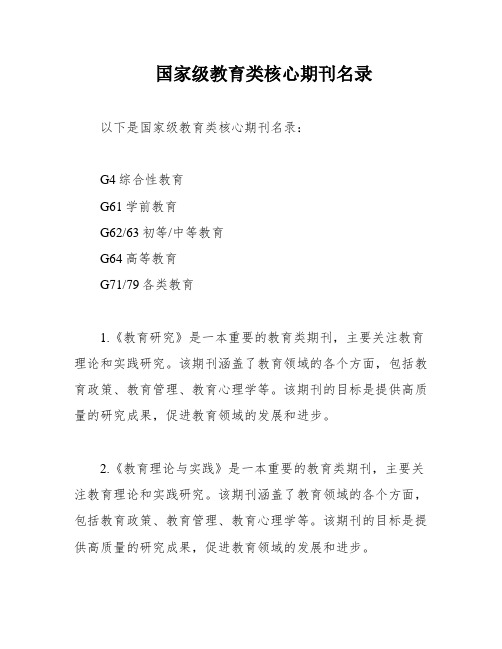
国家级教育类核心期刊名录以下是国家级教育类核心期刊名录:G4综合性教育G61学前教育G62/63初等/中等教育G64高等教育G71/79各类教育1.《教育研究》是一本重要的教育类期刊,主要关注教育理论和实践研究。
该期刊涵盖了教育领域的各个方面,包括教育政策、教育管理、教育心理学等。
该期刊的目标是提供高质量的研究成果,促进教育领域的发展和进步。
2.《教育理论与实践》是一本重要的教育类期刊,主要关注教育理论和实践研究。
该期刊涵盖了教育领域的各个方面,包括教育政策、教育管理、教育心理学等。
该期刊的目标是提供高质量的研究成果,促进教育领域的发展和进步。
3.《比较教育研究》是一本重要的教育类期刊,主要关注国际教育比较研究。
该期刊涵盖了教育领域的各个方面,包括教育政策、教育管理、教育心理学等。
该期刊的目标是提供高质量的研究成果,促进教育领域的发展和进步。
4.《全球教育展望》是一本重要的教育类期刊,主要关注国际教育发展趋势和教育政策。
该期刊涵盖了教育领域的各个方面,包括教育管理、教育心理学、教育技术等。
该期刊的目标是提供高质量的研究成果,促进教育领域的发展和进步。
5.《教育评论》是一本重要的教育类期刊,主要关注教育理论和实践研究。
该期刊涵盖了教育领域的各个方面,包括教育政策、教育管理、教育心理学等。
该期刊的目标是提供高质量的研究成果,促进教育领域的发展和进步。
6.《中国教育学刊》是一本重要的教育类期刊,主要关注中国教育领域的研究。
该期刊涵盖了教育领域的各个方面,包括教育政策、教育管理、教育心理学等。
该期刊的目标是提供高质量的研究成果,促进中国教育领域的发展和进步。
7.《外国教育研究》是一本重要的教育类期刊,主要关注国外教育领域的研究。
该期刊涵盖了教育领域的各个方面,包括教育政策、教育管理、教育心理学等。
该期刊的目标是提供高质量的研究成果,促进国际教育领域的发展和进步。
8.《人民教育》是一本重要的教育类期刊,主要关注中国教育领域的研究。
Volume 3 Number 1 March, 2008
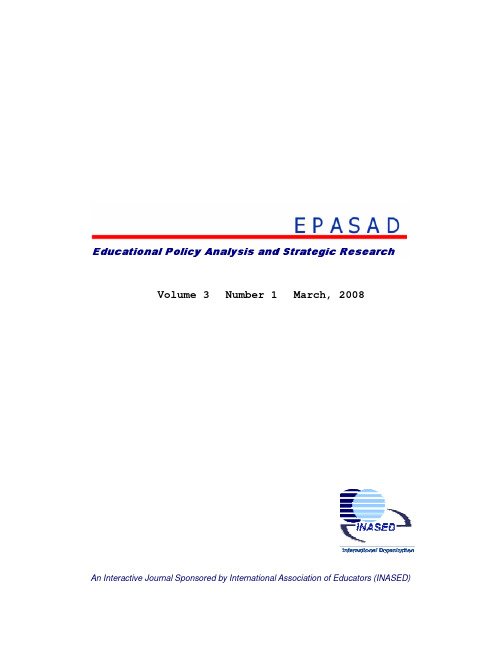
Journal of Educational Policy Analysis and Strategic Research2008 Subscription Rates•$35 Association Member USA (Canada: $40; Rest of World: $50)•$45 Individual USA (Canada: $50; Rest of World: $55)•$35 Student USA (Canada: $40; Rest of World: $50)•$140 Library/Institution USA (Canada: $160; Rest of World: $160)Single Issues and Back Issues: $25 USA (Canada: $35; Rest of World: $35)If you wish to subscribe for the printed edition of EPASAD, please send the subscription fee as check or money order (payable to International Association of Educators) to the following address:International Association of Educators1965 S. Orchard Street #DUrbana, IL 61801 USAPrint copies of past issues are also available for purchased by contacting the Customer Service department subscription@Journal of Educational Policy Analysis and Strategic Research Editor:Haluk Soran Hacettepe ÜniversitesiManaging EditorsMustafa Yunus Eryaman Mustafa KoçNihat Gürel Kahveci University of Illinois at Urbana-Champaign University of Illinois at Urbana-Champaign University of Illinois at Urbana-ChampaignEditorial Review BoardPetek AskarEsin AtavHakan DedeogluAyşe Ottekin Demirbolat Ihsan Seyit Ertem Nezahat GüçlüLeman TarhanCeren TekkayaErdal Toprakcı Mustafa UlusoyRauf YıldızMelek YamanAyhan Yılmaz Hacettepe ÜniversitesiHacettepe ÜniversitesiUniversity of FloridaGazi UniversitesiUniversity of FloridaGazi UniversitesiDokuz Eylül ÜniversitesiOrta Doğu Teknik Üniversitesi Cumhuriyet ÜniversitesiUniversity of Illinois at Urbana-Champaign Yüzüncü Yıl ÜniversitesiHacettepe ÜniversitesiHacettepe ÜniversitesiThe views expressed in this publication are not necessarily those of the Editor or the Editorial Review Board, nor the officers of the International Association of Educators (INASED).Copyright, 2008, International Association of Educators (INASED).TABLE OF CONTENTSVolume 3, Number 1:March 2008,From the Editor5Editorial StatementEryaman, Mustafa Y. & Y ang ChangyongArticles10“位育”之道——全球化中的华人教育路向The Way of “Wei Yu” — An Orientation of Education for the Chinese in the Globalizing World, by ZHANG Shiya16 学校转型中的领导发展与管理变革——参与“新基础教育”基地学校建设过 程的观察与体悟The Development of Leadership and Transformation of Management in School Transition — Observation and Apperception in the Construction of “New Basic Education”, by YANG Xiaowei36 中国新一轮普通高中新课程的新结构The New Structure of the New Curricula in New Round Ordinary High Schools in China, by LIAO Boqin43中国教育社会学:困境、问题与发展取舍China’s Sociology of Education: Issues and Problems, by MA Hemin and HE FangBook Review56 评《西南民族文化与教育研究丛书》A Review on the Series of the Culture and Education Study of the EthnicMinorities in Southwest China, by NI ShengliEditorial StatementWe are pleased to present this special issue on the contemporary trends and issues of progressive education in China. China is a country not only with massive education, but also with a rich educational history dating back more than three thousand years. With this special issue, the Journal of Educational Policy Analysis and Strategic Research has paid attention to the current developments in theory and practice of China’s education.Four articles and one book review are being published in the current issue reflecting China’s contemporary progressive education from different sides.In The Way of “Wei Yu” -- An Orientation of Education for the Chinese in the Globalizing World, Professor Zhang Shiya discussed the characteristics of contemporary Chinese education in the context of globalization and internalization. Professor Zhang pointed out that the concept of Chinese includes not only the 56 ethnic groups inhabiting in China, but also Chinese descendants overseas. The author argued that all Chinese people have a common basis of identification: four words, “Zhong He Wei Yu”(center, harmony, position, birth), have been engraved in Dacheng Hall of Confucian temple in Qufu City, Shandong Province. Education for the Chinese Groups advocated by Professor Zhang expatiate a philosophical approach of Chinese culture: rich in individuality, harmony in society and Great Harmony all over the world.In the second paper,the Development of Leadership and Transformation of Management in School Transition --Observation and Apperception in the construction of “New Basic Education”, Professor Yang Xiaowei , as an important member of “New Basic Education” Group, analyzed and summarized the transformation of leaders and managers in experimental schools. Professor Yang indicated that multi-value orientation of Education Reform based on participation and democracy not only put forward the urgency of school transition reform, but also offer great challenge and tribulation to the role of school leaders, including role-awareness, decision-making and project-planning. According to the author, the “pushing down the focus” strategy carried out by Base Schools not only strengthened the awareness of “First Responsible Person”, but also opened up a space for self-practice in disquisitive reform, and also inspired teachers to think independently. It also offered them the will to research corporately, the desire and the vigor to develop themselves and brought favorable interaction between system renovation and culture construction. Professor Yang Xiaowei’s paper demonstrated many vivid pictures of elementary schools and high schools’ education reform.In the third paper, The Structure of the New Curricula in New Round Ordinary High Schools in China, Professor Liao Boqin first discussed the structural relationship of the learning fields, subjects and modules, and then expatiated on their exhibition in new high school physic curricula. Professor Liao pointed out that there are eight fields in the new high school curricula, including Language and Literature, Mathematics,Human Culture and Society, Science, Technology, Art, Physical Education and Integrated Practice. Each learning field has one or more subjects, and each subject has some modules which are the basic units of curricular content. High school physics curriculum has the same structure as mentioned, yet it emphasizes the unification of fundamentality and selectivity. In the new curriculum of ordinary high school, module is the central unit of curriculum structure. There are twelve modules falling into two parts: required courses and elective courses. Each module has multiple education functions, and the series formed by modules represents different emphases of education function. Each set of modules contains not only the physical concepts, rules and experiments, but also other aspects like the thoughts and methods of physics , physics and development of society, physics and application of technology, physics and life, etc. The new physic curriculum for high school emphasizes the advancement of national sensitivity on the basis of Nine-Year Compulsory Education and the foundation of students’ lifelong study.In the fourth paper, China’s Sociology of Education: Issues and Problems, written by Professor Ma Hemin and Ms. He Fang explored the four periods in the development of China’s Sociology of Education: establishing period (1922-1949), standstill period (1949-1979), reconstruction period (1979-1998) and new development period since 1998. The paper mainly discussed the course of development, difficulties encountered, problems existing and choice of development of Sociology of Education in China.We hope you enjoy reading this issue and encourage you to submit your valuable works to coming issues of the journal.Mustafa Yunus ERYAMAN YANG ChangyongManaging Editor Guest Editor编者语中国是一个人口大国,也是一个教育大国。
国内外基础教育领域跨学科学习实践研究--基于系统性文献综述法

国内外基础教育领域跨学科学习实践研究--基于系统性文献综述法孔晶;杨媛;廖倩;刘家亮【期刊名称】《现代教育技术》【年(卷),期】2024(34)6【摘要】近年来,跨学科学习已经成为国内外学习科学领域的热点和重点,但研究者在其内涵、学科整合本质及实践路径等方面尚未达成共识。
为此,文章聚焦国内外基础教育领域跨学科学习实践中学科整合、项目实施、目标达成三大问题,采用系统性文献综述法梳理分析。
研究发现:相关课程和广域课程是目前学科整合的两大模式,相关课程是基于学科大概念、结合学生生活形成问题,广域课程是基于学生真实生活,结合自然生态、社会热点、科技产品等形成问题,技术和工程是实现学科整合的关键途径;基于项目、问题、探究、设计的学习均是开展跨学科学习实践的常用模式,但相对而言,国外强调工程设计实践,国内较为关注产品创新思维;学生对STEM学科的理解、态度、学科素养、21世纪技能、自我效能感、自信心、STEM职业兴趣等是研究者所普遍关注的培养目标。
文章通过研究,旨在为一线教师打破传统思维模式、提升教学法和技术整合能力以深入开展跨学科学习实践提供支持。
【总页数】8页(P63-70)【作者】孔晶;杨媛;廖倩;刘家亮【作者单位】佛山科学技术学院人文与教育学院;广东医科大学教育技术与信息中心【正文语种】中文【中图分类】G40-057【相关文献】1.如何支持与评价协作学习中的共享调节?——基于2007-2020年国内外共享调节研究的系统性文献综述2.数字人文在我国档案领域的综合应用研究:基于CNKI 的系统性文献综述3.近十年国内外羽毛球教学研究最新进展及启示——基于2011-2021年29篇文献的系统性文献综述法4.“互联网+”教师专业发展的实践模式、规律与原则--基于国内外核心期刊的系统性文献综述5.高校在线课程中的同伴互动——基于国内外研究的系统性文献综述因版权原因,仅展示原文概要,查看原文内容请购买。
教师专业化研究文献综述

教师专业化研究文献综述本文将全面深入地探讨国外教师教育者的专业化发展研究,综述相关文献并总结现有成果。
教师教育者专业化发展研究背景和意义教师教育者专业化发展研究旨在提高教师教育质量,培养更多具有专业技能和知识水平的教师,从而提高教育教学水平。
教师教育者专业化发展的研究和实践对于教师个人职业发展、学校教育质量以及整个社会的教育水平都具有重要意义。
在过去的几十年中,国外教师教育者专业化发展研究已经取得了长足的进展。
研究者们对教师教育者的专业化发展过程、影响因素、政策支持等方面进行了深入探究。
然而,在现有的研究中,仍存在一些问题,如对教师教育者专业化发展的标准不够明确,实证研究不足等。
教师教育者专业化发展研究旨在培养具备专业化水平和能力的教师教育者,其实质是提高教师教育质量。
在现有的研究中,研究者们普遍认为,教师教育者专业化发展主要包括以下几个方面:专业知识和技能的发展、专业道德和态度的发展、专业自主权的发展等。
然而,在实践过程中,仍存在一些问题。
例如,对教师教育者的专业化发展标准不够明确,缺乏统一的认识;教师教育者专业发展的途径和方式单一,缺乏多样性;教师教育者专业知识与技能的培养缺乏针对性等。
国外教师教育者专业化发展的政策支持与推进措施各国政府和教育机构都意识到教师教育者专业化发展的重要性,纷纷出台相关政策,加大投入力度,推动教师教育者专业化发展。
例如,美国政府设立专门基金,鼓励教师教育者参与专业发展计划;英国政府推出“教学卓越框架”,通过评价和奖励机制,提高教师教育者的专业水平;日本政府制定“教师教育者能力提高计划”,针对不同阶段的教师教育者进行培训和指导等。
国外教师教育者专业化发展的研究方法和研究成果研究者们采用了多种研究方法,如文献综述、案例分析、实证研究等,对教师教育者专业化发展进行了全方位的研究。
这些研究主要围绕以下几个方面展开:教师教育者专业化发展的标准与评估方法;教师教育者专业化发展的影响因素与机制;教师教育者专业化发展的途径与策略等。
国内移动技术辅助外语教学研究述评-基于2000-2015年期刊文献的统计分析_李思萦 高原

为了更全面地了解国内移动外语教学的研究 动向,本文对 CSSCI 来源文献中的研究对象进行 了统计(见表 1) ,发现高校学生为移动教学的主 要研究对象,占研究总数的 54%。这主要是由于 高校较好的科研环境及学生群体中移动设备的高 普及率能为应用研究提供便利。未涉及具体研究 对象的研究占总数的 33%,从宏观角度进行的概
80
李思萦
高
原
图2 2.2 研究对象
近15年移动辅助外语教学文献研究方法 述仍是研究热点,这与我国移动外语教学还处于 成长期的阶段性特征一致。其次,面向职业或成 人教育的研究占文献总数的 8%。最初的移动学习 研究源于远程教育领域,早期成人教育和职业教 育是远程教育主要服务的群体,所以面向该领域 的移动外语教学研究还有继续扩展的可能。而面 向中小学基础教育和教师群体的研究数量相对较 少,仅占文献总数的 5%。
表1 移动辅助外语教学文献的研究对象 研究对象 高校 未提及/其他 职业院校/成人教育 基础教育(中小学) 教师 合计 2.3 来源期刊分布 根 据 CSSCI 中 文 社 会 科 学 引 文 索 引 来 源 期 刊对学科的划分,样本文献来源期刊的学科可以 大致分为教育学、语言学、图书馆、情报与文献 学、高校综合性学报、新闻学与传播学五类(见 图 3) 。其中教育学类期刊种类和发表文献数量最 多,分别占样本总数的 49% 和 64%,如《现代教 百分比 54 33 8 4 1 100 育技术》 、 《中国远程教育》 、 《电化教育研究》等。 其次为语言学类期刊,分别占期刊和文献总数的 18% 和 20%,如《外语电化教学》等。值得注意 的是,刊载移动技术辅助外语教学文献最多的前 九种期刊中,只有《外语电化教学》为语言学类 期刊,其他均为教育技术类期刊(见图 4) 。
教师科学素养 国内外文献综述

教师科学素养国内外文献综述全文共四篇示例,供读者参考第一篇示例:教师科学素养是指教师在教学实践中应具备的科学知识、科学精神和科学方法,以提高教学质量、推动学生综合素养的全面发展。
科学素养不仅仅是指对科学知识的掌握,更重要的是要具备科学的思维方法和批判性思维能力,能够运用科学知识解决问题,培养学生的创造性和探究精神。
在国内外的研究中,教师科学素养一直是一个备受关注的话题。
国内的研究表明,教师科学素养直接影响到学生的学习成绩和综合素养的提高。
一些研究发现,教师科学素养与学生的学术成绩呈正相关关系,具有较高科学素养的教师更能够激发学生的学习兴趣,促进学生的自主学习。
教师科学素养还与学校教学质量和学生学习氛围密切相关,能够有效提高学校的整体教育水平。
教师科学素养的提升是一个长期而系统的过程,需要教师注重自身素养的提高和持续的专业发展。
教师可以通过参加专业培训、参与科研课题、与同行交流等方式提高自身的科学素养。
学校和教育部门也应该加强对教师科学素养的培训和支持,为教师提供更多的发展机会和资源,共同推动教师科学素养的提升,进一步提高教育质量。
教师科学素养是教学工作中不可或缺的一环,对于提高学生的综合素养和推动学校教育水平的提高具有重要意义。
通过国内外的研究综述可以看出,提升教师科学素养是一个全方位的工作,需要教师、学校和教育部门的共同努力,才能达到最佳效果。
相信在不久的将来,随着各方的共同努力,教师科学素养必将得到进一步的提升,为教育事业的发展做出更大的贡献。
【文章2000字】第二篇示例:教师科学素养是指教师掌握科学知识、科学方法和科学精神,能够运用这些知识和方法指导学生学习和培养学生的科学精神和科学素养的能力。
教师科学素养不仅是提高教师教学水平和教学质量的基础,也是培养学生科学素养的关键。
国内外许多学者对教师科学素养进行了深入研究,不断探讨如何提高教师科学素养,促进教育事业发展。
一、国内研究有研究表明,提高教师科学素养需要加强教师的科学知识培训和科学方法教育。
教育类外文核心期刊列表
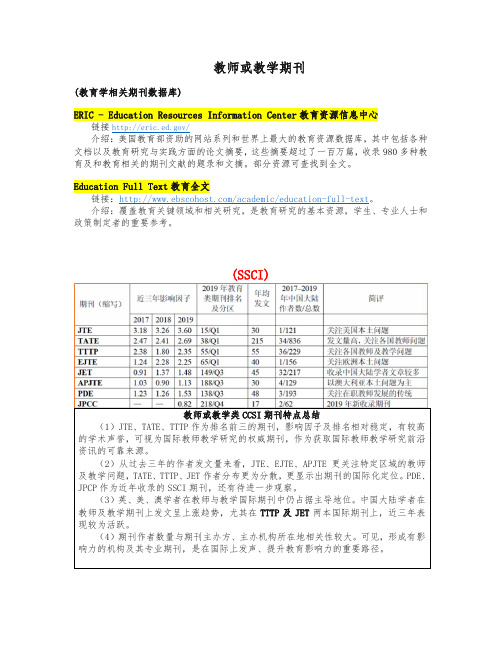
教师或教学期刊(教育学相关期刊数据库)ERIC - Education Resources Information Center教育资源信息中心链接/介绍:美国教育部资助的网站系列和世界上最大的教育资源数据库,其中包括各种文档以及教育研究与实践方面的论文摘要,这些摘要超过了一百万篇,收录980多种教育及和教育相关的期刊文献的题录和文摘。
部分资源可查找到全文。
Education Full Text教育全文链接:/academic/education-full-text。
介绍:覆盖教育关键领域和相关研究,是教育研究的基本资源,学生、专业人士和政策制定者的重要参考。
(SSCI)1、Journal of Teacher Education 《教师教育杂志》Journal of Teacher Education(JTE)2019年影响因子为3.60,在所有期刊中排名15。
JTE创刊于1950年,作为美国教师教育学院协会(American Association of Colleges for Teacher Education,AACTE)的旗舰杂志,JTE一直稳坐教师教育类期刊的头把交椅。
AACTE会员机构超800所,几乎囊括了全美主要的教师教育机构,其会刊的影响力可见一斑。
尽管JTE每年发文量只有30篇,但文章引用率较高,2017年以来影响因子稳定在3.0以上。
JTE主要关注美国本土的教师政策、教师培养、基本理论等问题,因此较少发表非英美系国家的研究。
就笔者所查结果来看,近五年发文专门针对中国情境的研究仅有1篇。
以JCR对2017-2019的作者贡献统计来看,美国有99位作者,而第二名的澳大利亚只有4位学者,中国大陆仅1位学者。
2、Teaching and Teacher Education 《教学与教师教育》Teaching and Teacher Education(TATE)2019年影响因子为2.686,排名38。
国内外教师专业发展阶段研究述评
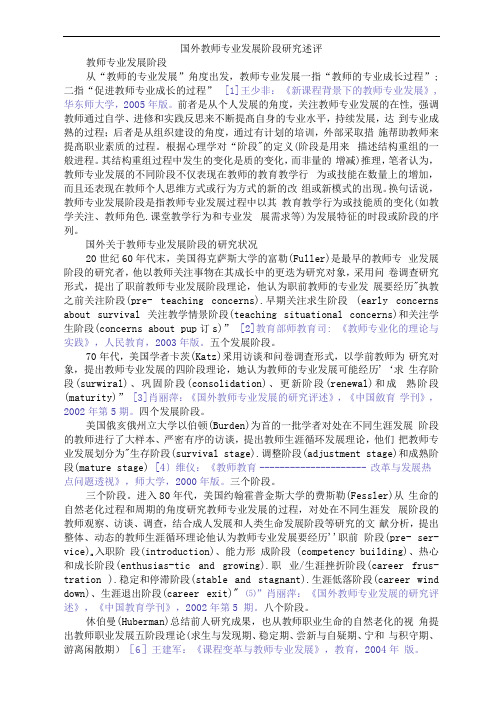
国外教师专业发展阶段研究述评教师专业发展阶段从“教师的专业发展”角度出发,教师专业发展一指“教师的专业成长过程”; 二指“促进教师专业成长的过程” [1]王少非:《新课程背景下的教师专业发展》, 华东师大学,2005年版。
前者是从个人发展的角度,关注教师专业发展的在性, 强调教师通过自学、进修和实践反思来不断提髙自身的专业水平,持续发展,达到专业成熟的过程;后者是从组织建设的角度,通过有计划的培训,外部采取措施帮助教师来提髙职业素质的过程。
根据心理学对“阶段"的定义(阶段是用来描述结构重组的一般进程。
其结构重组过程中发生的变化是质的变化,而非量的增减)推理,笔者认为,教师专业发展的不同阶段不仅表现在教师的教育教学行为或技能在数量上的增加,而且还表现在教师个人思维方式或行为方式的新的改组或新模式的出现。
换句话说,教师专业发展阶段是指教师专业发展过程中以其教育教学行为或技能质的变化(如教学关注、教师角色.课堂教学行为和专业发展需求等)为发展特征的时段或阶段的序列。
国外关于教师专业发展阶段的研究状况20世纪60年代末,美国得克萨斯大学的富勒(Fuller)是最早的教师专业发展阶段的研究者,他以教师关注事物在其成长中的更迭为研究对象,采用问卷调查研究形式,提出了职前教师专业发展阶段理论,他认为职前教师的专业发展要经历"执教之前关注阶段(pre- teaching concerns).早期关注求生阶段(early concerns about survival 关注教学情景阶段(teaching situational concerns)和关注学生阶段(concerns about pup订s)” [2]教育部师教育司: 《教师专业化的理论与实践》,人民教育,2003年版。
五个发展阶段。
70年代,美国学者卡茨(Katz)釆用访谈和问卷调查形式,以学前教师为研究对象,提出教师专业发展的四阶段理论,她认为教师的专业发展可能经历'‘求生存阶段(surwiral)、巩固阶段(consolidation)、更新阶段(renewal)和成熟阶段(maturity)” [3]肖丽萍:《国外教师专业发展的研究评述》,《中国斂育学刊》,2002年第5期。
外语教师教育研究资源

1.教师知识1.1期刊类Clandinin, D. J., & Connelly, F. M. (1986). Rhythms in teaching: The narrative study of teachers’ personal practical knowledge of classrooms. Teaching and Teacher Education,2 (4), 377-387. Clandinin, D. J., & Connelly, F. M. (1996). Teachers’ professional knowledge landscapes: Teacher stories-stories of teachers-school stories-stories of schools. Educational Researcher, 25 (3), 24-30. Connelly, F. M., & Clandinin, D. J. (1986). On narrative method, personal philosophy and narrative unities in the story of teaching.Journal of Research in Science Teaching,23 (4), 293-310. Connelly, F. M., & Clandinin, D. J. (1990). Stories of experience and narrative inquiry. Educational Researcher,19 (5), 2-14. Connelly, F. M., & Clandinin, D. J. (2001). Telling and retelling our stories on the professional knowledge landscape. Teachers and Teaching: Theory and Practice, 7(2),143-156.Connelly, F. M., Clandinin, D. J., & He, Ming Fang. (1997). Teachers’ personal practical knowledge on the professional knowledge landscape. Teaching and Teacher Education, 13 (7),665-674. Elbaz, F. (1981). The teacher’s “practical knowledge”: A report of a case study. Curriculum Inquiry, 11 (1),43-71.Fenstermacher, G. D. (1994). The knower and the known: The nature of knowledge in the research on teaching. In L. Darling-Hammond (Ed.), Review of Research in Education (pp.3-56). Washington D. C.: AERA.Freeman, D. (2002). The hidden side of the work: Teacher knowledge and learning to teach. Language Teaching, (34),1-13.Grossman, P. L. (1989). A study in contrast: sources of pedagogical content knowledge for secondary English teachers. J ournal of Teacher Education, 40 (5), 24-32.Johnson, K. E. (1996). The role of theory in L2 teacher education. TESOL Quarterly, (30), 765-772.Shulman, L. S. (1987). Knowledge and teaching: foundation of the new reform. Harvard Educational Review, 15 (2), 4-14.陈向明(2003),实践性知识:教师专业发展的知识基础,《北京大学教育评论》,(1): 104-112。
《义务教育阶段学困生研究国内外文献综述》3600字

义务教育阶段学困生研究国内外文献综述1 国外研究现状国外对学困生的研究首先体现在对学困生的定义上:美国学者起初将学困生定义为“学习不良”的学生,后来将学困生定义为“在不同的学科中表现出来的在知识的理解和接受上较其他学生的延迟”,到上个世纪80年代,学困生定义修改为指在听、说、读、写、推理和数学能力的获得和运用上有明显的困难或障碍的学生;同时期的欧洲,前苏联教育家苏霍姆林斯基将非智力因素作为判断学生是否为学困生的首要因素,并指出学生学习困难的原因是教师教育方法的不当。
在对学困生成因的研究方面:巴班斯基通过对3000名学习成绩较低的学生进行研究分析,得到了影响学生成绩的主要因素是为教育因素,在影响学生成绩的内因和外因的论述上与美国学者维纳也有相似之处,并提出了“教学过程最优化”来促进教育教学;德韦克和科尔布都以训练的手段,在一段时间内对学困生进行训练,包括从成绩上和心理上,经过这样一个过程都提高了学生学习的动机,增强了自信心;日本教育家北尾伦彦认为造成学生学习困难的因素主要有三类。
一是与教学活动相关包括学校、老师、学生的多种因素,二是以兴趣、性格、动机等为主的心理性因素。
三是不同因素和环境方面的关系,包括家庭、学校、班级等的诸多因素。
佐野良五郎则从学生自身出发,更加具体的分析了学困生的成因,主要包括心理因素和生理因素两个方面。
Norm Long通过实际的调查总结出,学生学习困难的主要原因在于其整体人格发展存在障碍,其中心理成熟度、无法自我调节和适应环境,是造成学习困难的直接原因。
在对学困生的转化研究方面,赞科夫针对学困生的转化提出了五条教学新原则,最著名的一条就是:“使全班学生包括差生都得到发展,即平等对待每一个学生”,他认为差生的求知欲低,甚至对学习、老师有反感,是因为他们过于以自我为中心、心理负担过重。
英国著名教育家彼德•切斯曼和菲利普•瓦茨提倡,学校要将培养良好的行为习惯作为目标,对学困生的行为进行积极正确的管理。
《信息检索》操作题题库
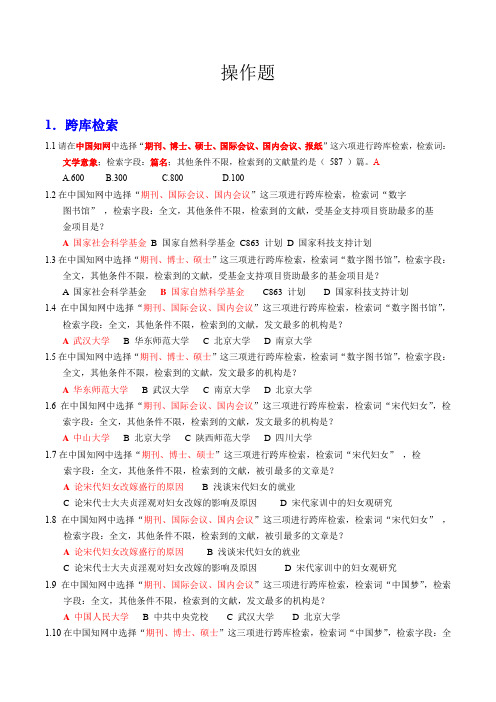
操作题1.跨库检索1.1请在中国知网中选择“期刊、博士、硕士、国际会议、国内会议、报纸”这六项进行跨库检索,检索词:文学意象;检索字段:篇名;其他条件不限,检索到的文献量约是(587 )篇。
AA.600B.300C.800D.1001.2在中国知网中选择“期刊、国际会议、国内会议”这三项进行跨库检索,检索词“数字图书馆”,检索字段:全文,其他条件不限,检索到的文献,受基金支持项目资助最多的基金项目是?A 国家社会科学基金B 国家自然科学基金C863 计划D 国家科技支持计划1.3在中国知网中选择“期刊、博士、硕士”这三项进行跨库检索,检索词“数字图书馆”,检索字段:全文,其他条件不限,检索到的文献,受基金支持项目资助最多的基金项目是?A 国家社会科学基金B 国家自然科学基金C863 计划 D 国家科技支持计划1.4在中国知网中选择“期刊、国际会议、国内会议”这三项进行跨库检索,检索词“数字图书馆”,检索字段:全文,其他条件不限,检索到的文献,发文最多的机构是?A 武汉大学B 华东师范大学C 北京大学D 南京大学1.5在中国知网中选择“期刊、博士、硕士”这三项进行跨库检索,检索词“数字图书馆”,检索字段:全文,其他条件不限,检索到的文献,发文最多的机构是?A 华东师范大学B 武汉大学C 南京大学D 北京大学1.6在中国知网中选择“期刊、国际会议、国内会议”这三项进行跨库检索,检索词“宋代妇女”,检索字段:全文,其他条件不限,检索到的文献,发文最多的机构是?A 中山大学B 北京大学C 陕西师范大学D 四川大学1.7在中国知网中选择“期刊、博士、硕士”这三项进行跨库检索,检索词“宋代妇女”,检索字段:全文,其他条件不限,检索到的文献,被引最多的文章是?A 论宋代妇女改嫁盛行的原因B 浅谈宋代妇女的就业C 论宋代士大夫贞淫观对妇女改嫁的影响及原因D 宋代家训中的妇女观研究1.8在中国知网中选择“期刊、国际会议、国内会议”这三项进行跨库检索,检索词“宋代妇女”,检索字段:全文,其他条件不限,检索到的文献,被引最多的文章是?A 论宋代妇女改嫁盛行的原因B 浅谈宋代妇女的就业C 论宋代士大夫贞淫观对妇女改嫁的影响及原因D 宋代家训中的妇女观研究1.9在中国知网中选择“期刊、国际会议、国内会议”这三项进行跨库检索,检索词“中国梦”,检索字段:全文,其他条件不限,检索到的文献,发文最多的机构是?A 中国人民大学B 中共中央党校C 武汉大学D 北京大学1.10在中国知网中选择“期刊、博士、硕士”这三项进行跨库检索,检索词“中国梦”,检索字段:全文,其他条件不限,检索到的文献,发文最多的机构是?A 中共中央党校B 吉林大学C 中国人民大学D 北京大学1.11在中国知网中选择“期刊、博士、硕士、国际会议、国内会议、报纸”这六项进行跨库检索,检索词:文学意象;检索字段:篇名;其他条件不限,检索到的文献量约是587 篇。
教育学CSSCI期刊高被引论文的学术特征研究_张楠

2017年1月当代教育与文化Jan.2017 第9卷第1期Contemporary Education and Culture Vol.9No.1 [收稿日期]2016-11-13[基金项目]天津市2016年度哲学社会科学规划重点课题“立德树人背景下中学生语数外核心素养测评———以语数外为例”(TJJX16-007)[作者简介]张楠(1984—),女,天津人,博士,天津师范大学《数学教育学报》编辑,主要从事教育理论刊物研究教育学CSSCI期刊高被引论文的学术特征研究张 楠,王光明(天津师范大学教师教育学院,天津 300387)[摘 要]为了研究教育学高被引论文的学术特征,对33种教育学CSSCI期刊进行分析,选取1998—2015年发表的被引频次≧50的4711篇高被引论文作为研究对象,从宏观、微观两个层面,运用科学知识图谱法与内容分析法,对高被引论文从发表年份、研究者和研究机构、研究内容、研究方法四个方面进行定量和定性研究。
发现教育类高被引论文具有被持续引用的特征,高被引论文的作者多来自高校、教育研究机构,在教育学各分支领域具有高影响力;研究内容具有把握经典,聚焦热点,关注焦点的特征;研究方法以思辨为主,具有介绍、综述(述评)、实证、行动研究等多元发展的趋势。
[关键词]教育学;CSSCI;高被引论文;学术特征[中图分类号]G 40 [文献标识码]A [文章编号]1674-5779(2017)01-0017-06 中国教育学领域公开发表的期刊论文已近300万篇(CNKI,2016),论文质量是学术期刊生存发展的基石,同时也揭示着中国教育学领域学术研究的实力和水平。
文献计量学常使用论文被引频次作为衡量论文质量和研究者学术影响力的重要指标,高被引论文被学界认为是某一研究领域中有重要影响的“经典之作”[1]。
国内外学者致力于高被引论文的研究,从学科发展的高度整体审视高水平研究的特征,促进研究水平提升的同时为学术期刊的发展提供借鉴。
文献检索第三次作业
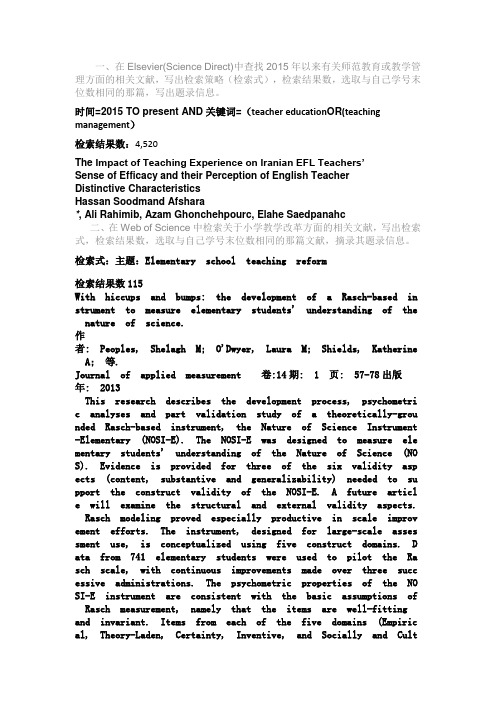
一、在Elsevier(Science Direct)中查找2015年以来有关师范教育或教学管理方面的相关文献,写出检索策略(检索式),检索结果数,选取与自己学号末位数相同的那篇,写出题录信息。
时间=2015 TO present AND关键词=(teacher education OR(teaching management)检索结果数:4,520The Impact of Teaching Experience on Iranian EFL Teachers’Sense of Efficacy and their Perception of English TeacherDistinctive CharacteristicsHassan Soodmand Afshara*, Ali Rahimib, Azam Ghonchehpourc, Elahe Saedpanahc二、在Web of Science中检索关于小学教学改革方面的相关文献,写出检索式,检索结果数,选取与自己学号末位数相同的那篇文献,摘录其题录信息。
检索式:主题:Elementary school teaching reform检索结果数115With hiccups and bumps: the development of a Rasch-based in strument to measure elementary students' understanding of the nature of science.作者: Peoples, Shelagh M; O'Dwyer, Laura M; Shields, Katherine A; 等.Journal of applied measurement 卷:14期: 1 页: 57-78出版年: 2013This research describes the development process, psychometri c analyses and part validation study of a theoretically-grou nded Rasch-based instrument, the Nature of Science Instrument -Elementary (NOSI-E). The NOSI-E was designed to measure ele mentary students' understanding of the Nature of Science (NO S). Evidence is provided for three of the six validity asp ects (content, substantive and generalizability) needed to su pport the construct validity of the NOSI-E. A future articl e will examine the structural and external validity aspects.Rasch modeling proved especially productive in scale improv ement efforts. The instrument, designed for large-scale asses sment use, is conceptualized using five construct domains. D ata from 741 elementary students were used to pilot the Ra sch scale, with continuous improvements made over three succ essive administrations. The psychometric properties of the NO SI-E instrument are consistent with the basic assumptions of Rasch measurement, namely that the items are well-fitting and invariant. Items from each of the five domains (Empiric al, Theory-Laden, Certainty, Inventive, and Socially and Culturally Embedded) are spread along the scale's continuum and appear to overlap well. Most importantly, the scale seems appropriately calibrated and responsive for elementary schoo l-aged children, the target age group. As a result, the NO SI-E should prove beneficial for science education research.As the United States' science education reform efforts mov e toward students' learning science through engaging in auth entic scientific practices (NRC, 2011), it will be important to assess whether this new approach to teaching science i s effective. The NOSI-E can be used as one measure of whe ther this reform effort has an impact.三、在CNKI中检索一篇本专业的博士论文,写出你选择的学科领域,检索结果数,摘录结果中序号与你学号末位数相同的那篇论文的题录信息。
教师发展379篇国内外期刊文献 - 副本
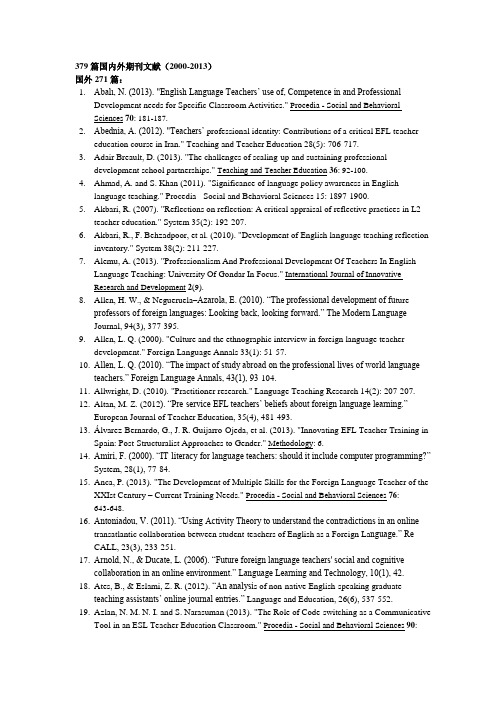
379篇国内外期刊文献(2000-2013)国外271篇:1.Abalı, N. (2013). "English Language Teachers‘ use of, Competence in and ProfessionalDevelopment needs for Specific Classroom Activities." Procedia - Social and BehavioralSciences 70: 181-187.2.Abednia, A. (2012). "Teachers‘ professional identity: Contributions of a critical EFL teachereducation course in Iran." Teaching and Teacher Education 28(5): 706-717.3.Adair Breault, D. (2013). "The challenges of scaling-up and sustaining professionaldevelopment school partnerships." Teaching and Teacher Education 36: 92-100.4.Ahmad, A. and S. Khan (2011). "Significance of language policy awareness in Englishlanguage teaching." Procedia - Social and Behavioral Sciences 15: 1897-1900.5.Akbari, R. (2007). "Reflections on reflection: A critical appraisal of reflective practices in L2teacher education." System 35(2): 192-207.6.Akbari, R., F. Behzadpoor, et al. (2010). "Development of English language teaching reflectioninventory." System 38(2): 211-227.7.Alemu, A. (2013). "Professionalism And Professional Development Of Teachers In EnglishLanguage Teaching: University Of Gondar In Focus." International Journal of InnovativeResearch and Development 2(9).8.Allen, H. W., & Negueruela–Azarola, E. (2010). ―The professional development of fu tureprofessors of foreign languages: Looking back, looking forward.‖ The Modern LanguageJournal, 94(3), 377-395.9.Allen, L. Q. (2000). "Culture and the ethnographic interview in foreign language teacherdevelopment." Foreign Language Annals 33(1): 51-57.10.Allen, L. Q. (2010). ―The impact of study abroad on the professional lives of world languageteachers.‖ Foreign Language Annals, 43(1), 93-104.11.Allwright, D. (2010). "Practitioner research." Language Teaching Research 14(2): 207-207.12.Altan, M. Z. (2012). ―Pre-service EFL teachers‘ beliefs about foreign language learning.‖European Journal of Teacher Education, 35(4), 481-493.13.Álvarez-Bernardo, G., J. R. Guijarro-Ojeda, et al. (2013). "Innovating EFL Teacher Training inSpain: Post-Structuralist Approaches to Gender." Methodology: 6.14.Amiri, F. (2000). ―IT-literacy for language teachers: should it include computer programming?‖System, 28(1), 77-84.15.Anca, P. (2013). "The Development of Multiple Skills for the Foreign Language Teacher of theXXIst Century – Current Training Needs." Procedia - Social and Behavioral Sciences 76:643-648.16.Antoniadou, V. (2011). ―Using Activity Theory to understand the contradictions in an onlinetransatlantic collaboration between student-teachers of English as a Foreign La nguage.‖ ReCALL, 23(3), 233-251.17.Arnold, N., & Ducate, L. (2006). ―Future foreign language teachers' social and cognitivecollaboration in an online environment.‖ Language Learning and Technology, 10(1), 42.18.Ates, B., & Eslami, Z. R. (2012). ―An analysi s of non-native English-speaking graduateteaching assistants‘ online journal entries.‖ Language and Education, 26(6), 537-552.19.Azlan, N. M. N. I. and S. Narasuman (2013). "The Role of Code-switching as a CommunicativeTool in an ESL Teacher Education Classroom." Procedia - Social and Behavioral Sciences 90:458-467.20.Bakker, M. E. J., E. C. Roelofs, et al. (2011). "Video portfolios." Studies in EducationalEvaluation 37(2-3): 123-133.21.Bakx, A., L. Baartman, et al. (2013). "Development and evaluation of a summative assessmentprogram for senior teacher competence." Studies In Educational Evaluation.22.Banegas, D., A. Pavese, et al. (2013). "Teacher professional development through collaborativeaction research: impact on foreign English-language teaching and learning." Educational Action Research 21(2): 185-201.23.Bannink, A. (2009). "How to capture growth? – Video narratives as an instrument forassessment in teacher education." Teaching and Teacher Education 25(2): 244-250.24.Barkhuizen, G. (2008). ―A narrative approach to exploring context in language teaching.‖ ELTjournal, 62(3), 231-239.25.Barkhuizen, G. and S. Borg (2010). "Editorial: Researching language teacher education."Language Teaching Research 14(3): 237-240.26.Bartels, N. (2003). "How teachers and researchers read academic articles." Teaching andTeacher Education 19(7): 737-753.27.Bell, T. R. (2005). ―Behaviors and attitudes of effective foreign language teachers: Results of aquestionnaire study.‖ Foreign Language Annals, 38(2), 259-270.28.Ben-Peretz, M. (2011). "Teacher knowledge: What is it? How do we uncover it? What are itsimplications for schooling?" Teaching and Teacher Education 27(1): 3-9.29.Benson, P. (2010). ―Teacher education and teacher autonomy: Creating spaces forexperimentation in se condary school English language teaching.‖ Language TeachingResearch, 14(3), 259-275.30.Biçaku, R. Ç. (2011). "CLIL and Teacher Training." Procedia - Social and Behavioral Sciences15: 3821-3825.31.Borg, S. (2006). ―The distinctive characteristics of foreign language teachers.‖ LanguageTeaching Research, 10(1), 3-3132.Borg, S. (2011). "The impact of in-service teacher education on language teachers‘ beliefs."System 39(3): 370-380.33.Buczynski, S. and C. B. Hansen (2010). "Impact of professional development on teacherpractice: Uncovering connections." Teaching and Teacher Education 26(3): 599-607.34.Burden, P. (2008). "ELT teacher views on the appropriateness for teacher development of endof semester student evaluation of teaching in a Japanese context." System 36(3): 478-491. 35.Burgess, J., & Spencer, S. (2000). ―Phonology and pronunciation in integrated languageteaching and teacher education.‖ System, 28(2), 191-215.36.Burke, B. M. (2006). ―Theory meets practice: A case study of pre-service world languagetea chers in US secondary schools.‖ Foreign Language Annals, 39(1), 148-166.37.Busch, D. (2010). ―Pre-service teacher beliefs about language learning: The second languageacquisition course as an agent for change.‖ Language Teaching Research, 14(3), 318-337. 38.Büyükyavuz, O. (2013). "Professional Development for Turkish Teachers of English: Is it amust or Luxury?" Procedia - Social and Behavioral Sciences 89: 363-367.39.Byrd, D. R., Hlas, A. C., Watzke, J., & Valencia, M. F. M. (2011). ―An examination of cultureknowledge: A study of L2 teachers' and teacher educators' beliefs and practices.‖ ForeignLanguage Annals, 44(1), 4-39.40.Cabaroglu, N. (2013). Action Research as a Tool to Enhance Professional Development ofProspective Efl Teachers. 3rd International Conference on Foreign Language Teaching and Applied Linguistics, IBU Publishing.41.Cabaroglu, N., & Roberts, J. (2000). ―Development in student teachers' pre-existing beliefsduring a 1-year PGCE programme.‖ System, 28(3), 387-40242.Çalismasi, V., & Yeterl, K. (2010). Teacher efficacy scale: the study of validity and reliabilityand preservice Classroom teachers‘ self efficacy beliefs. Journal of Theory and Practice in Education, 6(1), 68-85.43.Campus, B. (2013). "A Critical Analysis of Foreign Language Pre-service Teacher Education inTurkey." Anthropologist 16(1-2): 319-324.44.Carless, D. (2013). "Innovation in language teaching and learning." The Encyclopedia of AppliedLinguistics.45.Cartaut, S. and S. Bertone (2009). "Co-analysis of work in the triadic supervision of preserviceteachers based on neo-Vygotskian activity theory: Case study from a French university institute of teacher training." Teaching and Teacher Education 25(8): 1086-1094.46.Catelly, Y. M. (2011). "The foreign language teacher's roles in response to the knowledgesociety requirements." Procedia - Social and Behavioral Sciences 11: 127-131.47.Çelik, S., S. Bayraktar-Çepni, et al. (2013). "The Need for Ongoing Professional Development:Perspectives of Turkish University-Level EFL Instructors." Procedia - Social and Behavioral Sciences 70: 1860-1871.48.Chacón, C. T. (2005). ―Teachers‘ perceived efficacy among English as a foreign languageteachers in middle schools in Venezuela.‖ Teaching and Teacher Education, 21(3), 257-272. 49.Chen, C. W. Y., & Cheng, Y. S. (2010). "A case study on foreign English teachers‘ challengesin Taiwanese elementary schools." System, 38(1): 41-49.50.Chen, W.C. (2012). "Professional growth during cyber collaboration between pre-service andin-service teachers." Teaching and Teacher Education 28(2): 218-228.51.Chen, Y. L. (2008). ―A mixed-method study of EFL teachers‘ Internet use in languageinstruction.‖ Teaching and Teacher Education, 24(4), 1015-1028.52.Chen, Y. M. (2012). "A Socio-Cultural Approach toward EFL Teacher Education in Taiwan.‖Procedia-Social and Behavioral Sciences, 55, 435-444.53.Cheng, C. M. (2012). The influence of college EFL teachers‘ understandings of interculturalcompetence on their self-reported pedagogical practices in Taiwan. English Teaching: Practice and Critique 11(1): 164-182.54.Chiang, M.-H. (2008). "Effects of fieldwork experience on empowering prospective foreignlanguage teachers." Teaching and Teacher Education 24(5): 1270-1287.55.Ching, C. C. and A. W. Hursh (2014). "Peer modeling and innovation adoption among teachersin online professional development." Computers & Education.56.Cisar, S. H. (2005). ―Collaborative teacher research: Learning with students.‖ ForeignLanguage Annals, 38(1), 77-88.57.Conway, P. F. and C. M. Clark (2003). "The journey inward and outward: a re-examination ofFuller's concerns-based model of teacher development." Teaching and Teacher Education19(5): 465-482.58.Cooper, T. C. (2004). ―How foreign language teachers in Georgia evaluate their professionalpreparation: A call for a ction.‖ Foreign Language Annals, 37(1), 37-48.59.Cowie, N. (2011). ―Emotions that experienced English as a foreign language (EFL) teachersfeel about their students, their colleagues and their work.‖ Teaching and Teacher Education, 27(1), 235-242.60.Coxhead, A. and P. Byrd (2007). "Preparing writing teachers to teach the vocabulary andgrammar of academic prose." Journal of Second Language Writing 16(3): 129-147.61.Crookes, G. (2010). ―Book review: Karen E. Johnson (2009). Second language teachereducation: A socio-cultural perspective.‖ New York: Routledge. Language Teaching Research, 14(3), 338-341.62.Cullen, R. (2001). ―The use of lesson transcripts for developing teachers' classroom language.‖System, 29(1), 27-43.63.Cvetek, S. (2008). ―Applying chaos theory to lesson planning and delivery.‖ European Journalof Teacher Education, 31(3), 247-256.64.Daloglu, A. (2004). "A professional development program for primary school English languageteachers in Turkey: designing a materials bank." International Journal of EducationalDevelopment 24(6): 677-690.65.Dang, T. K. A., H. T. M. Nguyen, et al. (2013). "The impacts of globalisation on EFL teachereducation through English as a medium of instruction: an example from Vietnam." Current Issues in Language Planning(ahead-of-print): 1-21.66.De Eça, M. T. T. P. (2005). ―Using portfolios for external assessment: An experiment inPortugal.‖ International Journal of Art & Design Education, 24(2), 209-218.67.Debreli, E. (2011). "Use of diaries to investigate and track pre-service teachers‘ beliefs aboutteaching and learning English as a foreign language throughout a pre-service training program."Procedia - Social and Behavioral Sciences 15: 60-65.68.Debreli, E. (2012). ―Change in Beliefs of Pre-service Teachers about Teaching and LearningEnglish as a Foreign Language throughout an Undergraduate Pre-service Teacher Training Program.‖ Procedia-Social and Behavioral Sciences, 46, 367-373.69.DeJaeghere, J. G. and Y. Cao (2009). "Developing U.S. teachers‘ intercultural competence:Does professional development matter?" International Journal of Intercultural Relations 33(5): 437-447.70.Dellinger, A. B., J. J. Bobbett, et al. (2008). "Measuring teachers‘ self-efficacy beliefs:Development and use of the TEBS-Self." Teaching and Teacher Education 24(3): 751-766. 71.Demirbulak, D. (2011). "Training English language student teachers to become teacher-researchers." Procedia - Social and Behavioral Sciences 30: 491-496.72.Diaz-Maggioli, G. H. (2003). “Professional development for language teachers.” ERIC Digest,03-03.73.Drewelow, I. (2013). "Exploring graduate teaching assistants' perspectives on their roles in aforeign language hybrid course." System 41(4): 1006-1022.74.Egel, İ. P. (2009). "The prospective English language teacher's reflections of self efficacy."Procedia - Social and Behavioral Sciences 1(1): 1561-1567.75.Er, M., S. Ülgü, et al. (2013). "The Journey of ELT Teachers from Apprenticeship to Mastery."Procedia - Social and Behavioral Sciences 70: 41-51.76.Eren, A. (2012). "Prospective te achers‘ future time perspective and professional plans aboutteaching: The mediating role of academic optimism." Teaching and Teacher Education28:111-123.77.Erkmen, B. (2012). ―Ways to Uncover Teachers‘ Beliefs.‖ Procedia-Social and BehavioralSciences, 47, 141-146.78.Evans, M. and E. Esch (2013). "The elusive boundaries of second language teacher professionaldevelopment." The Language Learning Journal 41(2): 137-141.79.Fareh, S. and A. T. Saeed (2011). "The teacher as researcher in the context of languageteaching." Procedia - Social and Behavioral Sciences 15: 153-159.80.Farrell, T. S. C. (2003). "Learning to teach English language during the first year: personalinfluences and challenges." Teaching and Teacher Education 19(1): 95-111.81.Farrell, T. S. C. (2006). "The first year of language teaching: Imposing order." System 34(2):211-221.82.Farrell, T. S. C. (2011). "Exploring the professional role identities of experienced ESL teachersthrough reflective practice." System 39(1): 54-62.83.Farrell, T. S. C. (2012). "Novice-Service Language Teacher Development: Bridging the Gapbetween Pre-service and In-Service Education and Development." TESOL Quarterly26(3):435-449.84.Farrell, T. S. C. (2013). "Reflecting on ESL teacher expertise: A case study." System 41(4):1070-1082.85.Feng, Y. (2012). "Teacher career motivation and professional development in special andinclusive education: perspectives from Chinese teachers." International Journal of Inclusive Education 16(3): 331-351.86.Feryok, A. (2008). "An Armenian Engli sh language teacher‘s practical theory ofcommunicative language teaching." System 36(2): 227-240.87.Feryok, A. (2009). "Activity theory, imitation and their role in teacher development." LanguageTeaching Research 13(3): 279-299.88.Feryok, A. (2010). "Language teacher cognitions: Complex dynamic systems?" System 38(2):272-279.89.Feryok, A. (2013). "Multidimensional language performance in training teachers for secondarycontent instruction through English." System 41(1): 15-24.90.Freeman, D. (2002). "The hidden side of the work: Teacher knowledge and learning to teach. Aperspective from north American educational research on teacher education in English language teaching." Language Teaching 35(01).91.Gebhard, M., I. A. Chen, et al. (2013). "Teaching to mean, writing to mean: SFL, L2 literacy,and teacher education." Journal of Second Language Writing 22(2): 107-124.92.Gebhard, M., J. Demers, et al. (2008). "Teachers as critical text analysts: L2 literacies andteachers‘ work in the context of high-stakes school reform." Journal of Second LanguageWriting 17(4): 274-291.93.Geyer, N. (2008). ―Reflective practices in foreign language teacher education: a view throughmicro and macro windows.‖ Foreign Language Annals, 41(4), 627-638.94.Gießler, R. (2012). ―Teacher lang uage awareness and cognitive linguistics (CL): building aCL-inspired perspective on teaching lexis in EFL student teachers.‖ Language Awareness, 21(1-2), 113-135.95.Gleeson, M. & Tait, C. (2012). ―Teachers as sojourners: Transitory communities in shortstudy-abroad programmes.‖ Teaching and Teacher Education 28:1144-1151.96.Glenwright, P. (2002). "Language proficiency assessment for teachers: The effects ofbenchmarking on writing assessment in Hong Kong schools." Assessing Writing 8(2): 84-109.97.Göbel, K. and A. Helmke (2010). "Intercultural learning in English as foreign languageinstruction: The importance of teachers‘ intercultural experience and the usefulness of precise instructional directives." Teaching and Teacher Education 26(8): 1571-1582.98.Goff-Kfouri, C. A. (2013). "Pre-service Teachers and Teacher Education." Procedia - Social andBehavioral Sciences 93: 1786-1790.99.Goh, C. C. (2013). "GLOBALIZATION AND TEACHER DEVELOPMENT FOR SPOKENENGLISH INSTRUCTION." Indonesian Journal of Applied Linguistics (IJAL) 3(1): 29-38. 100.Goker, S. D. (2006). "Impact of peer coaching on self-efficacy and instructional skills in TEFL teacher education." System 34(2): 239-254.101.Goldschmidt, P. and G. Phelps (2010). "Does teacher professional development affect content and pedagogical knowledge: How much and for how long?" Economics of Education Review 29(3): 432-439.102.Golombek, P. and K. Johnson (2004). "Narrative inquiry as a mediational space: examining emotional and cognitive dissonance in second-language teachers‘ dev elopment." Teachers and Teaching: Theory and Practice 10(3): 307-327.103.Golombek, P. and S. R. Jordan (2005). "Becoming ―black lambs‖ not ―parrots‖: A poststructuralist orientation to intelligibility and identity." TESOL Quarterly 39(3): 513-533. 104.Gu, M. M. (2013). "From pre-service to in-service teachers: a longitudinal investigation of the professional development of English language teachers in secondary schools." Educational Studies(ahead-of-print): 1-19.105.Gu, Q. (2005). "The perception gap in cross-cultural training: an investigation of British Council English language teaching projects in China." International Journal of Educational Development 25(3): 287-304.106.Guichon, N. (2009). ―Training future language teachers to develop online tutors‘ competence through reflective analysis.‖ Re CALL, 21(2), 166-185.107.Guo, Y., S. B. Piasta, et al. (2010). "Relations among preschool teachers' self-efficacy, classroom quality, and children's language and literacy gains." Teaching and Teacher Education 26(4): 1094-1103.108.Haley, M. H. (2004). ―Implications of using case study instruction in a foreign/second language methods course.‖ Foreign Language Annals, 37(2), 290-300.109.Hall, L. A., A. S. Johnson, et al. (2010). "Teacher identity in the context of literacy teaching: Three explorations of classroom positioning and interaction in secondary schools." Teaching and Teacher Education 26(2): 234-243.110.Hamman, D., K. Gosselin, et al. (2010). "Using possible-selves theory to understand the identity development of new teachers." Teaching and Teacher Education 26(7): 1349-1361. 111.Hargreaves, A. (2000). ―Mixed emotions: Teachers‘ perceptions of their interactions with students.‖ Teaching and teacher education, 16(8), 811-826.112.Hargreaves, A., & Fullan, M. (2000). ―Mentoring in the new millennium.‖ Theory into practice, 39(1), 50-56.113.Harris, D. L., & Anthony, H. M. (2001). ―Collegiality and its role in teacher development: Perspectives from veteran and novice teachers.‖ Teacher Development, 5(3), 371-390.114.Hayes, D. (2008). "Becoming a teacher of English in Thailand." Language Teaching Research 12(4): 471-494.115.Hayes, D. (2009). "Non-native English-speaking teachers, context and English language teaching." System 37(1): 1-11.116.He, A. E. (2009). "Bridging the gap between teacher educator and teacher in a community of practice: A case of brokering." System 37(1): 153-163.117.Hegemonies, T. R. T. S. C. (2012). Interactive Whiteboards in State School Settings: Teacher Responses to Socio-constructivist Hegemonies. About Language Learning & Technology, 65. 118.Heydon, R. & R. Stooke. (2012). "Border work: Teachers‘ expressions of their literacy-related professional development needs in a First Nations school." Teaching and Teacher Education 28:11-20.119.Hildebrandt, S. A. and M. Eom (2011). "Teacher professionalization: Motivational factors and the influence of age." Teaching and Teacher Education 27(2): 416-423.120.Hills, T. (2007). "Is constructivism risky? Social anxiety, classroom participation, competitive game play and constructivist preferences in teacher development." Teacher Development 11(3): 335-352.121.Hismanoglu, M. (2010). "Effective professional development strategies of English language teachers." Procedia - Social and Behavioral Sciences 2(2): 990-995.122.Hismanoglu, M. (2013). "Does English Language Teacher Education Curriculum Promote CEFR Awareness of Prospective EFL Teachers?" Procedia - Social and Behavioral Sciences 93: 938-945.123.Hismanoğlu, S. (2010). "Attitudes of L2 teachers towards Internet-based foreign language teaching." Procedia - Social and Behavioral Sciences 3: 106-111.124.Hiver, P. (2013). "The interplay of possible language teacher selves in professional development choices." Language Teaching Research 17(2): 210-227.125.Hobbs, V. and M. Kubanyiova (2008). "The challenges of researching language teachers: What research manuals don't tell us." Language Teaching Research 12(4): 495-513.126.Horwitz, E. K. (2005). ―Classroom management for teachers of Japanese and other foreign languages.‖ Foreign Language Annals, 38(1), 56-64.127.Hos, R. and H. Topal (2013). "The current status of English as a Foreign Language (EFL) teachers‘ professional development in Turkey: A systematic review of literature."Anthropologist 16(1-2): 293-305.128.Hu, Z., & McGrath, I. (2011). ―Innovation in higher edu cation in China: are teachers ready to integrate ICT in English language teaching?‖ Technology, Pedagogy and Education, 20(1), 41-59.129.Hung, H.-T. and H.-C. Yeh (2013). "Forming a change environment to encourage professional development through a teacher study group." Teaching and Teacher Education 36: 153-165. 130.Hung, S. T. A. (2012). ―A washback study on e-portfolio assessment in an English as a Foreign Language teacher preparation program.‖ Computer Assisted Language Learning, 25(1), 21-36. 131.Hüttner, J., U. Smit, et al. (2009). "ESP teacher education at the interface of theory and practice: Introducing a model of mediated corpus-based genre analysis." System 37(1): 99-109. 132.Inceçay, G. (2011). "Pre-service teachers‘ language learning beliefs and effects of these beliefs on their practice teaching." Procedia - Social and Behavioral Sciences 15: 128-133.133.İnceçay, G. and V. İnceçay (2010). "A case study on needs assessment of English language teachers." Procedia - Social and Behavioral Sciences 2(2): 317-321.134.Jiang, Y. and D. Zheng (2013). University EFL teacher learning in community of practice.Information Technology Based Higher Education and Training (ITHET), 2013 InternationalConference on, IEEE.135.Jiang, Y., H. Min, et al. (2013). A narrative inquiry into professional identity construction of university EFL teachers in China: A case study of three teachers based in community of practice.Information Technology Based Higher Education and Training (ITHET), 2013 InternationalConference on, IEEE.136.Johnson, K. A. (2003). "―Every experience is a moving force‖: identity and growth through mentoring." Teaching and Teacher Education 19(8): 787-800.137.Johnson, K. and S. Jackson (2006). "Comparing language teaching and other-skill teaching: Has the language teacher anything to learn?" System 34(4): 532-546.138.Johnson, K.E. (2006). The Sociocultural Turn and Its Challenges for Second Language Teacher Education. TESOL Quarterly 40(1):235-257.139.Johnston, B., & Irujo, S. (2001). ―Research and practice in language teacher education: Voices from the field.‖ In 1st International Conference on Language Teacher Education.140.Jovanova-Mitkovska, S. and D. Hristovska (2011). "Contemporary teacher and core competences for lifelong learning." Procedia - Social and Behavioral Sciences 28: 573-578. 141.Kabilan, M. K. (2013). "A phenomenological study of an international teaching practicum: Pre-service teachers' experiences of professional development." Teaching and Teacher Education 36: 198-209.142.Kabilan, M. K., & Khan, M. A. (2012). ―Assessing pre-service English language teachers‘ learning using e-portfolios: Benefits, challenges and c ompetencies gained.‖ Computers &Education, 58(4), 1007-1020.143.Kang, Y. and X. Cheng (2013). "Teacher learning in the workplace: A study of the relationship between a novice EFL teacher‘s classroom practices and cognition development." Language Teaching Research: 1362168813505939.144.Kanno, Y., & Stuart, C. (2011). ―Learning to Become a Second Language Teacher: Identities-in-Practice.‖ The Modern Language Journal, 95(2), 236-252.145.Kelchtermans, G. and K. Ballet (2002). "Micro political literacy: reconstructing a neglected dimension in teacher development." International Journal of Educational Research 37(8):755-767.146.Khan, I. A. (2012). ―Relevance of Teacher Development: The EFL Context of KSA.‖ Procedia-Social and Behavioral Sciences, 47, 756-764.147.Kiely, R. (2001). ―Classroom evaluation-values, interests and teacher development.‖ Language teaching research, 5(3), 241-261.148.Kiely, R. and M. Davis (2010). "From transmission to transformation: Teacher learning in English for speakers of other languages." Language Teaching Research 14(3): 277-295.149.Kleinsasser, R. C. (2013). "Language teachers: Research and studies in language(s) education, teaching, and learning in Teaching and Teacher Education, 1985–2012." Teaching and Teacher Education 29: 86-96.150.Kocoglu, Z. (2008). ―Turkish EFL student teachers‘ perceptions on the role of electronic portfolios in their professional development.‖ The Turkish Online Journal of EducationalTechnology, 7(3), 71-79.151.Koçoğlu, Z. (2009). "Exploring the technological pedagogical content knowledge of pre-service teachers in language education." Procedia - Social and Behavioral Sciences 1(1):2734-2737.152.Kost, C. R. (2008). ―Innovations in teaching assistant development: An apprenticeship model.‖ Foreign Language Annals, 41(1), 29-60.153.Kumaravadivelu, B. (2013). "Language teacher education for a global society: A modular model for knowing, analyzing, recognizing, doing and seeing." Language Teacher 16(4).154.Kunt, N. and Ç. Özdemir (2010). "Impact of methodology courses on pre-service EFL teachers‘ beliefs." Procedia - Social and Behavioral Sciences 2(2): 3938-3944.155.Kunt, N. and D. Ö. Tüm (2010). "Non-native student teachers‘ feelings of foreign language anxiety." Procedia - Social and Behavioral Sciences 2(2): 4672-4676.borda, J. G. (2010). ―Book review: Anne Burns and Jack Richards (Eds.) (2009). The Cambridge guide to second language teacher education. New York: Cambridge University Press.‖ Language Teaching Research, 14(3), 341-344.zăr, A. (2013). "Learner Autonomy and its Implementation for Language Teacher Training."Procedia - Social and Behavioral Sciences 76: 460-464.158.Lee, I. (2010). "Writing teacher education and teacher learning: Testimonies of four EFL teachers." Journal of Second Language Writing 19(3): 143-157.159.Lee, I. (2012). ―Becoming a writing teacher: Using ―identity‖ as an analytic lens to understand EFL writing teachers‘ development.‖ Journal of Second Language Writing.160.Lee, I. (2013). "Becoming a writing teacher: Using ―identity‖ as an analytic lens to understand EFL writing teachers‘ development." Journal of Second Language Writing 22(3): 330-345.161.Lee, J. F. K. (2009). "ESL student teachers' perceptions of a short-term overseas immersion programme." Teaching and Teacher Education 25(8): 1095-1104.162.Liaw, E.-C. (2009). "Teacher efficacy of pre-service teachers in Taiwan: The influence of classroom teaching and group discussions." Teaching and Teacher Education 25(1): 176-180. 163.Lin, W.C. (2012). Exploring personal EFL teaching metaphors in pre-service teacher education. English Teaching: Practice and Critique11 (1): 183-199.164.Liou, H. C. (2001). ―Reflective practice in a pre-service teacher education program for high school English teachers in Taiwan, ROC.‖ System, 29(2), 197-208.165.Liu, M. H. (2012). ―Discussing teaching video cases online: Perspectives of pre-service and in-service EFL teachers in Taiwan.‖ Computers & Education, 59(1), 120-133.166.Liu, Y. (2013). "The social organisation of talk-in-interaction at work in a language teacher professional community." Learning, Culture and Social Interaction 2(3): 195-207.167.Liu, Y. and Y. Xu (2011). "Inclusion or exclusion?: A narrative inquiry of a language teacher‘s identity experience in the ‗new work order‘ of competin g pedagogies." Teaching and Teacher Education 27(3): 589-597.168.Lomicka, L. and G. Lord (2007). "Social presence in virtual communities of foreign language (FL) teachers." System 35(2): 208-228.169.Lozano, A. S., Padilla, A. M., Sung, H., & Silva, D. M. (2004). ―A statewide professional development program for California foreign language teachers.‖ Foreign Language Annals, 37(2), 301-309.170.Luk, J. (2012). Teachers‘ ambivalence in integrating culture with EFL teaching in Hong Kong.Language, Culture and Curriculum 25(3):249–264.171.Luo, W.-H. (2013). "An Exploration of Professional Development Programs for Teachers of Collaborative Teaching of EFL in Taiwan: A Case Study." The Asia-Pacific Education。
姜宗钊教育背景

姜宗钊教育背景
摘要:
一、姜宗钊简介
二、教育背景
1.本科阶段
2.硕士阶段
3.博士阶段
正文:
【姜宗钊简介】
姜宗钊,我国知名教育学者,具有丰富的教育实践与管理经验,曾担任多所学校的领导职务。
在其教育生涯中,致力于推动教育改革与发展,为我国教育事业做出了巨大贡献。
【教育背景】
1.本科阶段
姜宗钊教授在本科阶段,就读于我国一所知名师范大学,主修教育学。
在本科学习期间,他深入研究教育理论,广泛涉猎教育心理学、课程与教学论等领域,为今后的教育实践奠定了坚实基础。
2.硕士阶段
在硕士阶段,姜宗钊教授选择了继续深造,并进入我国一所顶尖师范大学攻读教育学硕士学位。
期间,他深入研究了教育管理、教育政策等方向,进一步丰富了自己的教育理论知识体系。
3.博士阶段
姜宗钊教授在博士阶段,进入国外一所知名大学学习教育学。
在这个阶段,他通过对比研究国内外教育的差异与特点,进一步拓宽了自己的教育视野,并掌握了国际先进的教育理念与方法。
检索考试题库初步答案

检索考试题库初步答案*请留意每个问题后的提示。
一、是非题,判断下面的说法或描述是否正确,T(正确),F(错误)。
共5 题,每题2 分,共10 分。
(红色表示对的)1.Web of Science 核心数据库收录多学科内容,包括自然科学,社会科学,艺术与人文等领域。
○T ○F2.维普中文科技期刊数据库的任意字段检索就是在全文中执行检索,这种说法是3. 我校图书馆在对学校教学和科研的文献保障中,采用的是三级文献保障体系。
4.定题服务可以让系统将目标论文的最新被引用情况自动发送到您的注册邮箱。
5.Web of Science 核心数据库可以以基金资助机构或基金授权号字段检索基金相关论文信息。
6.Web of Science 平台上的数据库每周更新7.在Web of Science 核心数据库中只收录期刊文献,不可以检索会议文献。
8.Elsevier ScienceDirect平台上检索到的文献前面带有绿色标识是有权限看全文的9.没有影响因子的期刊肯定是没有被SCI 收录的期刊.10.Web of Science 平台只是一个查收查引的工具.11.被引参考文献检索能够检索包括期刊、会议录所收论文的被引用情况,但是对于图书等出版物的被引用情况的检索功能尚未实现。
12.在对文献的描述与著录中,责任者(著者)最为重要,应把它放在首位。
13.图书馆自助借还书机对图书的放置有严格的要求,必须是书脊朝下对准凹槽,否则会出错。
14.ResearcherID 是一个全球研究人员的学术交流社区,只能上载已发表论文信息,不能上载图书、专利等内容。
一、单项选择题,请在给出的选项中选择一个正确答案。
共15 题,每题2 分,共30 分。
3.我校的ISI Web of Knowledge 平台购买的数据是从:A 2000 年至今B 2004 年至今C 1997 年至今D 1888 年至今11.在“中国图书分类法”分类中,以下哪项是错误的:A O 数理科学和化学B E 军事C K 历史、地理D I 语言、文字16. 以下外文数据库中,属于全文数据库的是():A IEEE/IET Electronic Library (IEL)B Science Citation IndexC EID INSPEC17.我馆图书上粘贴的标签中的“K811”是指:A 索书号B 分类号C ISSN 号D ISBN 号20.在外文三大检索工具中,只收录期刊文献的是(),只收录会议文献的是(),既收录期刊文献又收录会议录文献的是().A SCI(SSCI) CPCI EIB SCI(SSCI) EI CPCIC CPCI EI SCI(SSCI)D EI SCI(SSCI) CPCI21.查找适合某特定电压的变压器电缆接线盒的国内标准,可以选择数据库:A 国家知识产权局数据库B 万方数据知识服务平台C 维普数据库22.题录文摘信息不包括:A 作者B 篇名C 文摘D 全文23.维普中文科技期刊数据库的布尔逻辑“与”用运算符()表示:A andB *C +D —24.在IEEE Xplore平台单个文献的统计页面“Metrics ”中可(这题建议选C)以查看的数据有?A 文献每月的下载量B 文献每天的下载量C 文献被专利的引用次数D 文献的参考文献信息26.中文电子资源中,维普数据资源系统属于:A 索引型数据库B 全文数据库C 文摘型数据库D 题录型数据库27.使用超星数字图书馆浏览和下载电子图书时,应安装()AApabi ReaderB Adobe ReaderC CAJ ViewerD SSReader29.加菲尔德博士在杂志上发表了一篇标志着SCI 诞生的一篇科学文献“Citation Indexes for Science –New Dimension in Documentation through Association of Ideas ”请问这篇文献是哪一年发表的?(提示:选择Web of Science 数据库,找到这篇文章即可)A 1955 年B 1962 年C 1965 年D 1975 年30.我馆购买的中国知识资源总库数据的年限是:A 1988 年至今B 1995 年至今C 1997 年至今D 2000 年至今31.想在IEEE Xplore获取文献中的高分辨率清晰图像,应如何操作?A 下载PDF 格式文献,直接将文献中图片保存到本地B 查看HTML 格式的文献,点选“Figures”标签,将其中的图片保存C 打开下载好的PDF 格式文献,用截图工具直接将图片截取保存D 进入文献的文摘页面,点选“Figures”标签,将其中的图片保存32.IEEE Xplore数据库中,以下哪种文献类型是没有的():A 期刊B 会议文集C 标准D 图书34.检索式“A and B”中布尔逻辑算符and 表示A 和B 之间()的逻辑关系:A 与B 或C 非35.在下列中文数据库中,哪个数据库不是文摘型数据库?A 中国知网(CNKI)B 维普数据库C 中文社会科学引文索引(CSSCI)D 万方数字资源系统36.以下外文电子资源中,属于全文数据库的是:A Science Citation IndexB EIC IEEE/IET Electronic Library (IEL)D INSPEC39.在“中国图书分类法”分类中,以下哪项是正确的:A D 交通运输B I 文学C N 数理科学和化学D H 哲学、宗教40.IEEE 成立于哪一年?A 1898B 1884C 1912D 196142.根据中国图书馆分类法,共把图书分成多少大类?A 22 类B 23 类C 25 类D 26 类47.在 中检索美国的法学期刊应该从以下哪个路径进入?A Get a DocumentB Lexis WebC Secondary LegalD Cases -US 提供了多少个国家和地区的法律信息?A 160 以下B 160-170C 170-180D 180-19049.以下外文电子资源中,属于全文数据库的有:A ScienceDirect OnlineB Science Citation IndexC EID INSPEC50.检索会议论文全文,可选择的数据库是:A OPACB 维普数据库C 超星图书馆D 万方数据知识服务平台51.中国期刊全文数据库中,在检索路径“全文”输入某个检索词,是指:A 在任何字段出现该词的论文B 全文中含有该词的论文C 在文摘字段出现该词的论文D 以上都不是52.Science Citation Index Expanded (SCI -EXPANDED)回溯年限为:A 1498 年B 1899 年C 1968 年D 1969 年53.中国知识资源总库下载的期刊论文,浏览全文必须安装:A IE 浏览器B SSreader阅读器C cajviewer浏览器或PDF 阅读器D 书生阅读器56.IEEE Xplore平台最新增加了哪类文献的更新提醒功能?A 期刊B 会议C 标准D 电子书57.二次检索指的是:A 第二次检索B 检索了一次之后,结果不满意,再检索一次C 在检索结果中运用“与、或、非”进行再限制检索D 以上都不是58.IEEE Xplore平台将在2014 年新增的内容是?A AIP 期刊B Alcatel -Lucent 贝尔实验室技术期刊C VDE 期刊D AVS 期刊59.下列可以从IEEE Xplore平台上访问开放获取内容的是?A IBM 期刊B AIBI 期刊C TUP 期刊D MIT 电子书61.在“中国图书分类法”分类中,以下哪项是正确的:A TM 电工技术B K 经济、法律C F 语言、文字D O 历史、地理64.SCI 数据库中已知一篇2006 年发表的文献,通过哪个信息可以了解与这篇文献有共同引文的文献?A 相关文献Related RecordsB 被引频次Times CitedC 被引参考文献Cited ReferencesD 出版年份Publication Year65.以下可以查阅电子图书的数据库是:A 维普数据资源系统B 中国知识资源总库C 读览天下D 读秀知识库69.中文电子资源中,中国知识资源总库属于:A 索引型数据库B 全文数据库C 文摘型数据库D 题录型数据库 中的哪个功能代表在结果中检索A Edit SearchB Show HitsC FOCUSD Search Within Results72.IEL 数据库包含的标准类型有?A ActiveB DraftC Archived DraftD Active Approved Draft74.查询某数据库中是否收录《自动化学报》,检索途径最好选择:A 关键词B 刊名D 著者77.在“中国图书分类法”分类中,以下哪项是错误的:A T 工业技术B A 哲学C J 艺术D F 经济78.IEL 数据库有多少种IEEE 现刊?A 120+B 170+C 200+D 400+79.在Web of Science 中进行机构检索时,需要在哪个字段进行检索?A 机构B 作者C 地址D 公司二、多项选择题,请在给出的选项中选择一个或多个正确答案。
- 1、下载文档前请自行甄别文档内容的完整性,平台不提供额外的编辑、内容补充、找答案等附加服务。
- 2、"仅部分预览"的文档,不可在线预览部分如存在完整性等问题,可反馈申请退款(可完整预览的文档不适用该条件!)。
- 3、如文档侵犯您的权益,请联系客服反馈,我们会尽快为您处理(人工客服工作时间:9:00-18:30)。
( 总第 2 7期)
T o t a l N o . 2 7
2 0 0 0. . . . 2 0 1 3 年 大 陆 作 者 在 国外发表 教 育类论 文情 况 研 究
—I 数 据 分 析
王 菁 ,曹 君
( 哈尔滨 工业 大学 图书馆 ,黑龙 江
一
时 间 限制 在 2 0 0 0—2 0 1 3年 。这 样 做 之 后 基 本 保
证 我们 的检 索结 果是 在教 育类 中 ,并且 文章 发表
在期刊 中。为了更清楚地 了解 S C I 和S S C I 在 收 录教育类 文 献在 内容 上 的差异 ,我 们将 统计 结果
和 结论 分别 写 出 。
从 文献 数量 上统 计 ,在 S C I 数据 库 中教 育类
期刊中检索得 到 1 2 2篇文献 ,包括 E D U C A T I O N S C I E N T I F I C D I A C I P L I N E S类别中有 1 0 1 篇 ,E D . U C A T I O N E D U C A T I O N A L R E S E A R C H 类 别 中有 3 6篇 ,它 们之 间有 双 收 文 献 1 5篇 。 此外 ,一般 期刊文献 ( A r t i c l e )1 2 0 篇 ,综 述 文 献 ( R e . v i e w)2篇 。 在S S C I 数据库 中教育类期 刊中检 索得到文
[ 摘
哈尔滨
1 5 0 0 0 1 )
要 ]通过文献计量 学的方 法,对我 国大陆学者 2 0 0 0 — 2 0 1 3 年之 间在 S C I 和S S C I 上发 表的教 育学
方 面的文献进 行研 究 ,从 文献量 、来源期刊 、著 者和 著者机构 、研 究方向还 有 引文情 况等五 个方面对发 表
E d u c a t i o n在 两 个 数 据 库 中进 行 检 索 , 限制 条 件 是 论文 作 者地址 是 中国 ,经 测试 香港 作者 发表 论
文 量是 大 陆作者 的一 倍还 多 ,而澳 门和 台湾 的作
统 计文 献量 的 目的是 为 了让读 者 了解这 段 时 间我 国大 陆 作 者 在 国外 发 表 论 文 被 S C I 和S S C I 收 录 的情况 ,了解学 科发 展趋 势 ,同时为下 面 的 研 究提 供数 据支 持 。
E N T I F I C D I S C I P L I N E S 类别中有 3 5 篇 ,E D U C A 一
[ 作者简介 ]王菁 ,哈 尔滨工业大学 图书馆 信 息咨询部 副研 究馆 员,主要从 事信 息 咨询 与科技 查新研 究 ;曹君 ,
哈 尔滨工业 大学图书馆信 息咨询部馆 员 ,主要 从事信息咨询研 究。
络版的名称 )分类 中有 E D U C A T I O N的类别 中 , 文献类型精 练到 A r t i c l e和 R e v i e w两种 类型 中,
【 收稿 日期 】2 0 1 5— 0 1 —1 5
R E S E A R C H类 别 中有 3 9 3篇 ,E D U C A T I O N S C I —
[ 文献标志码 ]A
[ 文章编号 ]2 0 9 5 — 0 2 9 2( 2 0 1 5 )0 2 — 0 1 5 9— 0 7
经 研究 发现 ,我 国大 陆学 者在 国外 教 育类 刊 物 上发 表文 章 的数量 和工 科类 相 比要 少很 多 ,原 因可能 是 以下 三点 : 一 是对 国外 的期 刊 收 录情 况 不 了解 ,总认 为 自己投稿 很难 被 收录 ;二是 对 每
.- -— —
1 5 9. - - — —
表3 S S C I中国作者 发表 3篇 以上 文 献的来 源 期刊 统计 排 名 1 刊名
C H I N E S E E D U C A T I O N A N D S 0 C I E T Y
的文献做 了统计 和分析 ,其 目的是帮助科研 工作 者通过 定量 的数 据 了解我 国大 陆作 者在教 育学方 面在 国 际 期刊上发表 文献的现状和能力 ,为今后在 国际期 刊上的投 稿指明方向 。 【 关键词 】S C I ; S S C I ;教育 学;文章 收录 ;文献计 量
[ 中图分类号 ]G 2 5 0 . 2
2 0 1 5年 第 2期
哈 尔 滨师 范大学社会科学 学报
J o u na r l o f S o c i a l S c i e n c e o f Ha r b i n N o r ma l Un i v e r s i t y
No . 2, 2 01 5
一
种期 刊 能够发 表 的主题 不 了解 ,投 稿方 向有 问
题 ;三是英 语程 度不 好 ,不 能将 文章 较完 美地 翻
译 成英 文 。
、
2 0 0 0— 2 0 1 3年 文献量 的 统计 与分 析
为了帮助读者对教育类国外期刊有更多的了 解 ,增加对这些期刊的投稿的信心,来提高 自己 的科研 水平 ,本 项研 究 将 S C I 和 S S C I 在2 0 0 0年 到2 0 1 3年 间收 录 中 国大 陆 作 者 发 表 的 文献 情 况 用 文献 计量 的方 式进 行统 计 ,并 给大 家做较 详 细 的介绍和分析。 本 项研 究 的数据 采集 方 法是 :分 别用 主题 词
献 4 2 6篇 ,包 括 E D U C A T I O N E D U C A T I O N A L
者 发表 文 献量很 少 ,因此 ,本项研 究 特别 去掉 了 香 港作 者 的地址 ,得到检 索结 果 之后 ,进 一步 地 精 练 。将检 索结 果精 练 到 w e b o f s c i e n c e( S C I网
哈尔滨师范大学社会科学学报journalsocialscienceharbinnormaluniversityno22015totalno2720002013年大陆作者在国外发表教育类论文情况研究基于sci和ssci数据分析哈尔滨工业大学图书馆黑龙江哈尔滨150001通过文献计量学的方法对我国大陆学者20002013年之间在sci和ssci上发表的教育学方面的文献进行研究从文献量来源期刊著者和著者机构研究方向还有引文情况等五个方面对发表的文献做了统计和分析其目的是帮助科研工作者通过定量的数据了解我国大陆作者在教育学方面在国际期刊上发表文献的现状和能力为今后在国际期刊上的投稿指明方向
